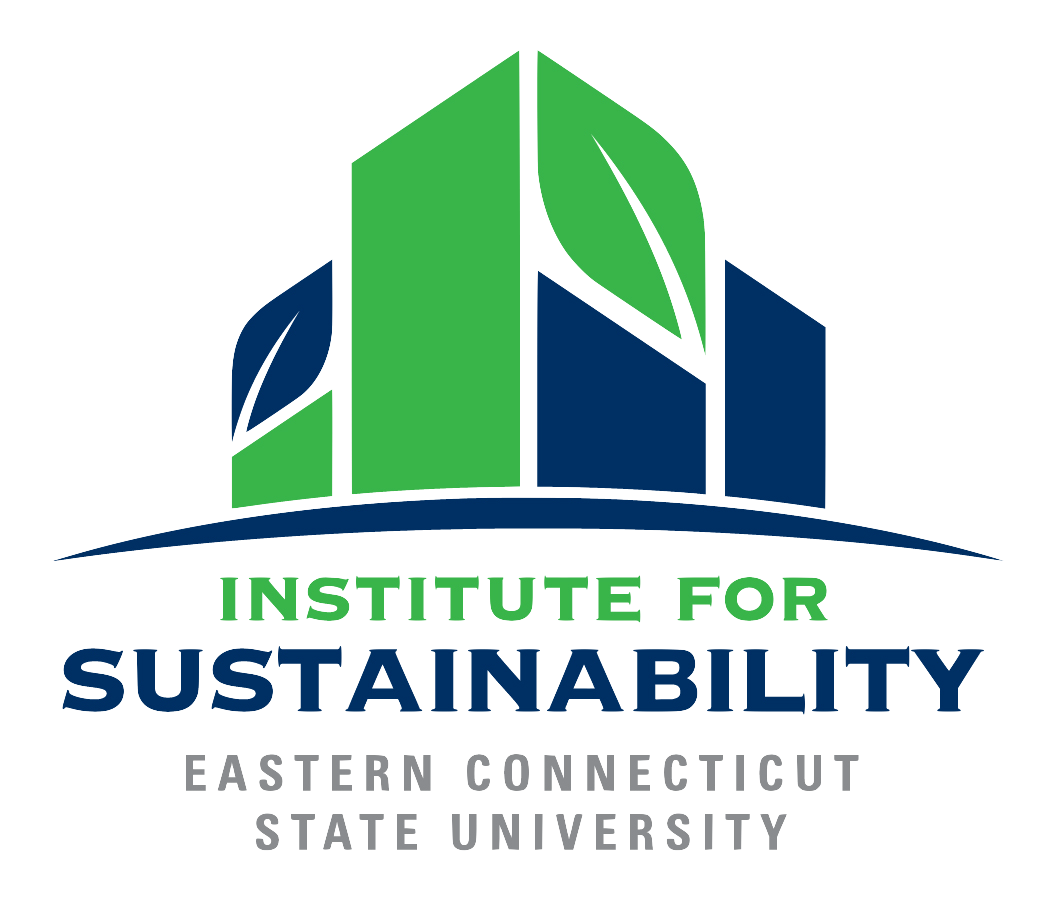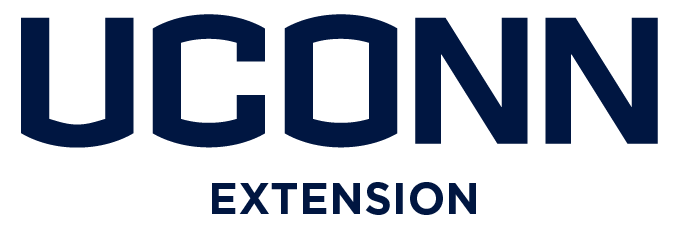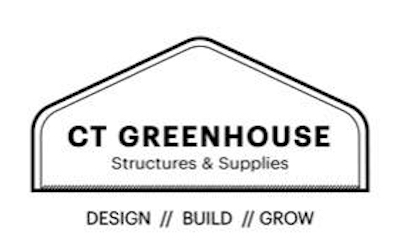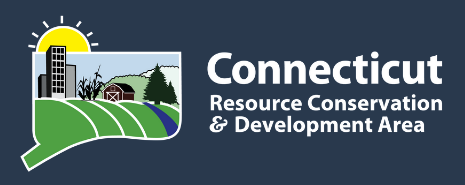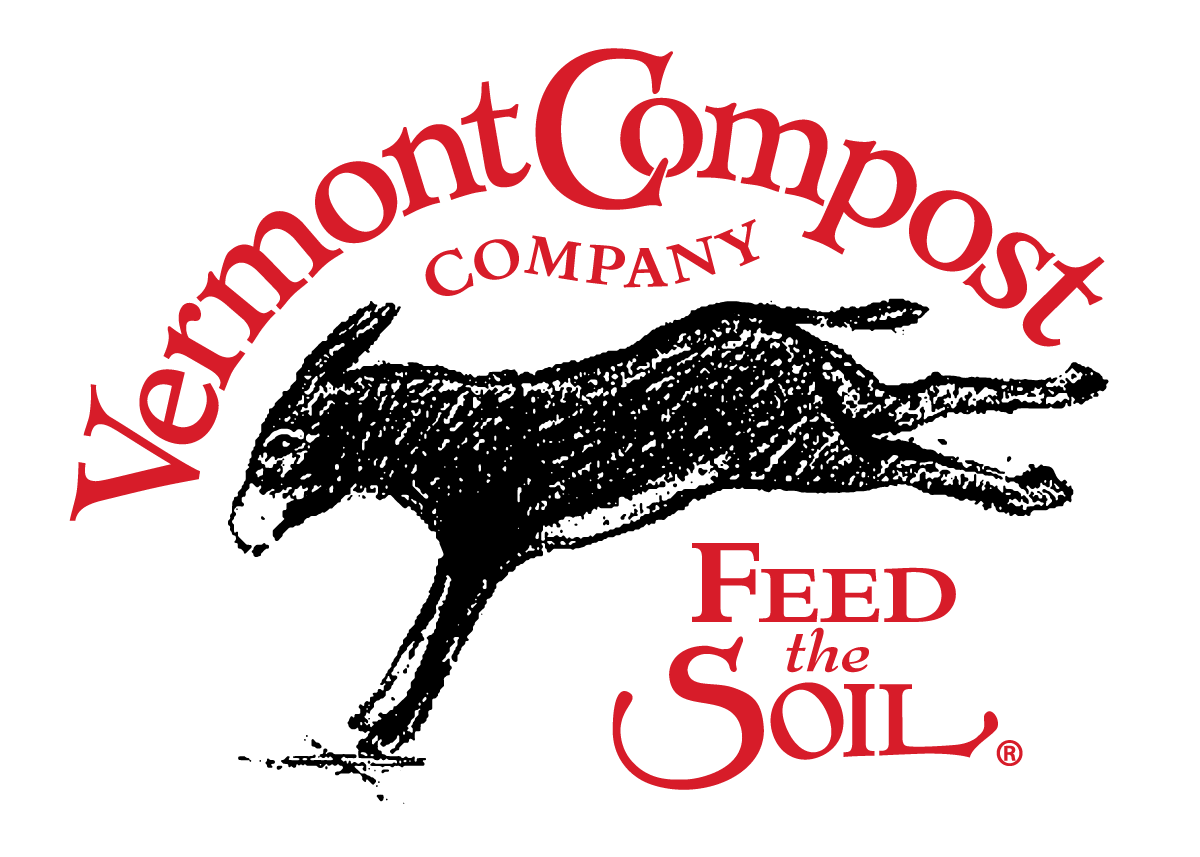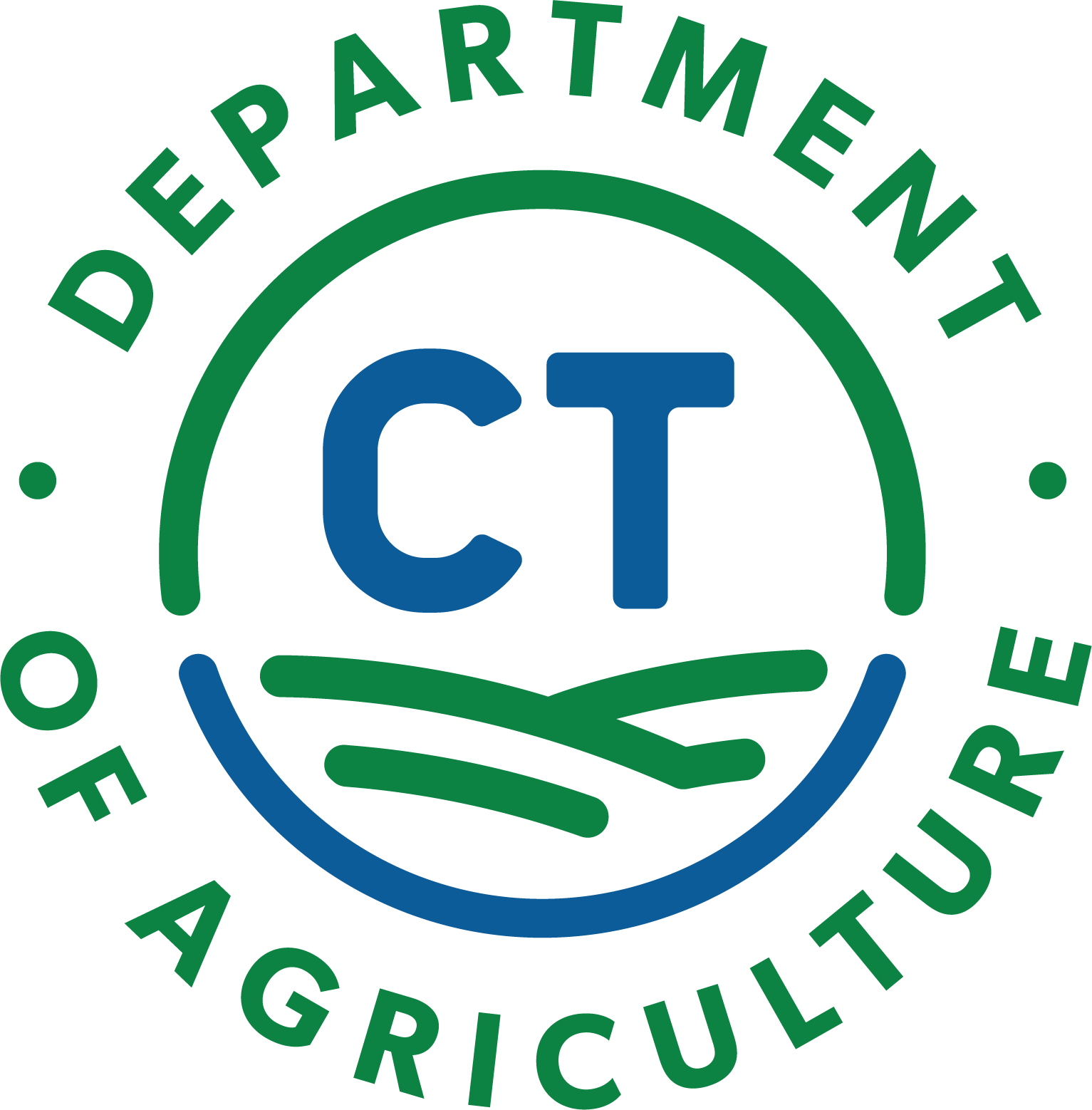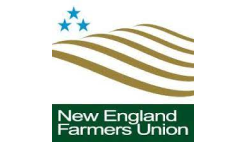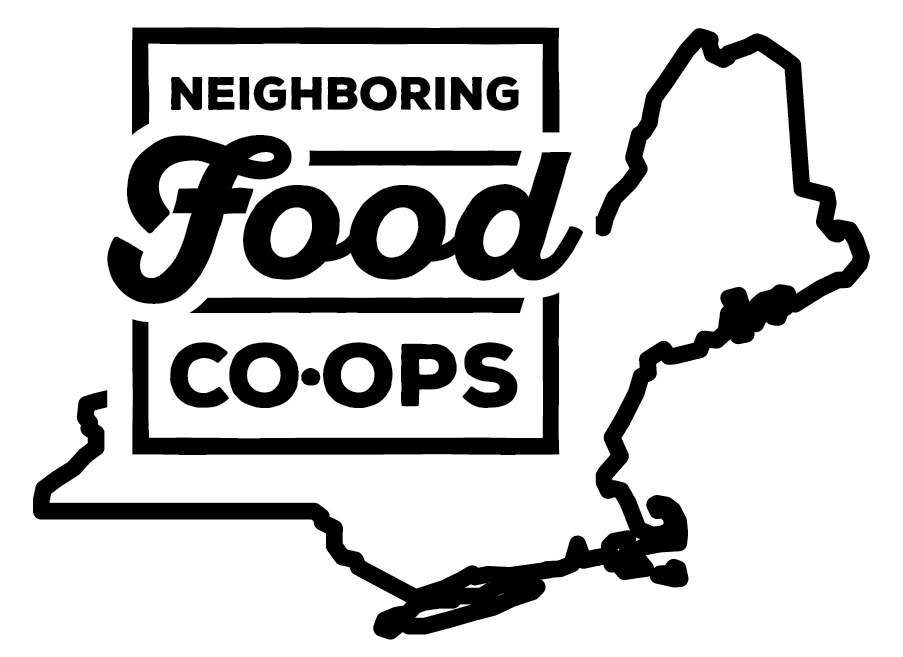
OUR WINTER CONFERENCE SPONSORS
Workshops
Workshop details
CT NOFA is proud to offer a variety of workshops, both virtually and in-person, at our winter conference. Workshops will cover topics such as farming, organic land care, government policy, homesteading and gardening, food equity and justice, and more. See our current roster of workshops, below.
Completed a workshop? Let us know your thoughts. Attendees may fill out this conference evaluation form once for every workshop they attend.
february 25 (online)
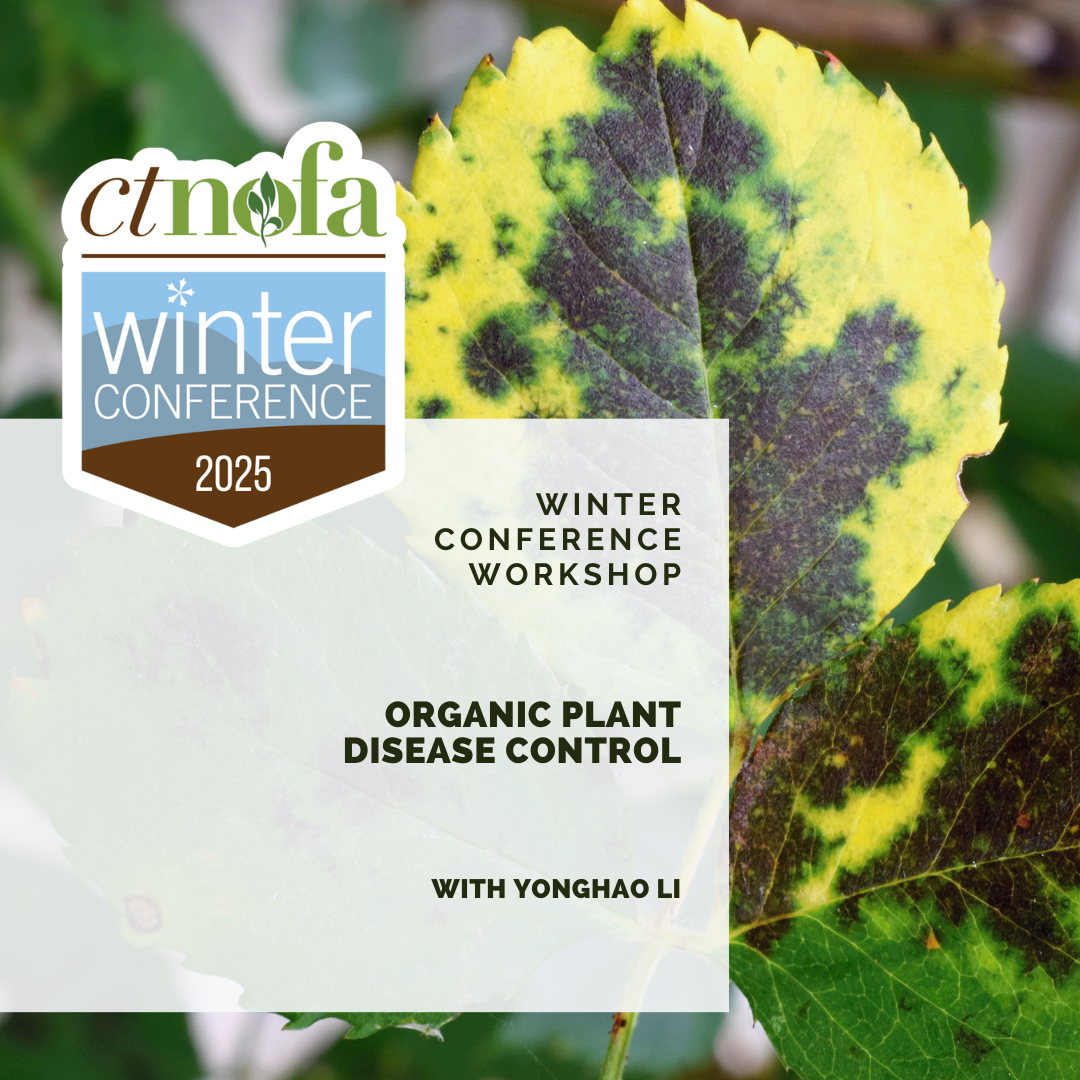
Organic Plant Disease Control
9:00 AM
YONGHAO LI | The Connecticut Agricultural Experiment Station
Tracks: Transition to Organic Farming
Many garden and landscape plants are susceptible to one or more plant diseases that can reduce the yield of vegetable crops and disfigure ornamental plants. Prevention is the best remedy to dealing with most plant diseases, which is much easier, and more effective, than treating a disease after it has affected a plant. This presentation will discuss correct disease diagnosis and eco-friendly approaches to disease management by understanding pathogen features, disease cycles, host resistance, environmental factors, and biological control agents.
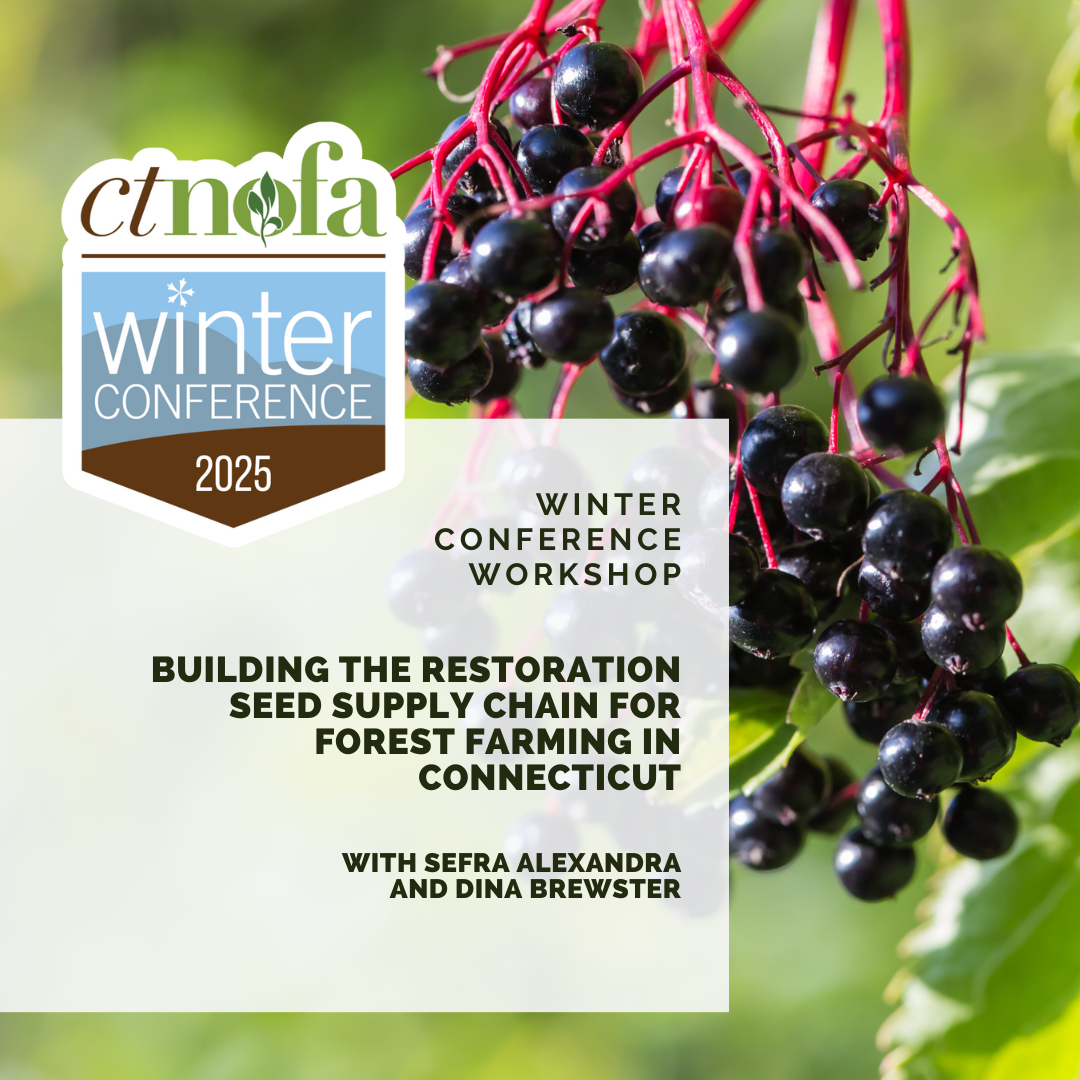
Forest Farming Meetup: Building the Restoration Seed Supply Chain in Connecticut
9:00 AM
SEFRA ALEXANDRA and DINA BREWSTER
Tracks: Organic Land Care
Are you curious about forest farming? Are you an experienced practitioner? Do you just love the woods?! Join us as we present the emerging work that has been conducted in the northeast around ecotypic seed increases and how we will now collectively apply this methodology to forest species.
In a significant move to support climate resilience and ecological restoration in Connecticut, The Hickories has received an NRCS Conservation Innovation Grant (CIG) to enhance the supply of locally adapted, ecotypic (native, regionally adapted) seeds for forest farming. This initiative builds on prior work by the Ecotype Project, and will expand The Hickories’ existing restoration seed farm (Northeast Seed Collective) from meadow species to include understory forest species such as willow, elderberry, and black cohosh. These species are vital for both ecological restoration and as crops for food, medicine, and other uses.
This project aims to address the need for ecotypic native plant material for forest farming and restoration in Connecticut, emphasizing climate resilience, biodiversity, and ecosystem services. By building a strong, community-driven supply chain for ecotypic seeds, we can enhance forest farming practices, support biodiversity, and contribute to broader restoration efforts in the Northeast.
Our goal is to start an informal conversation among like minded growers at the CT NOFA conference – Join us in this effort!
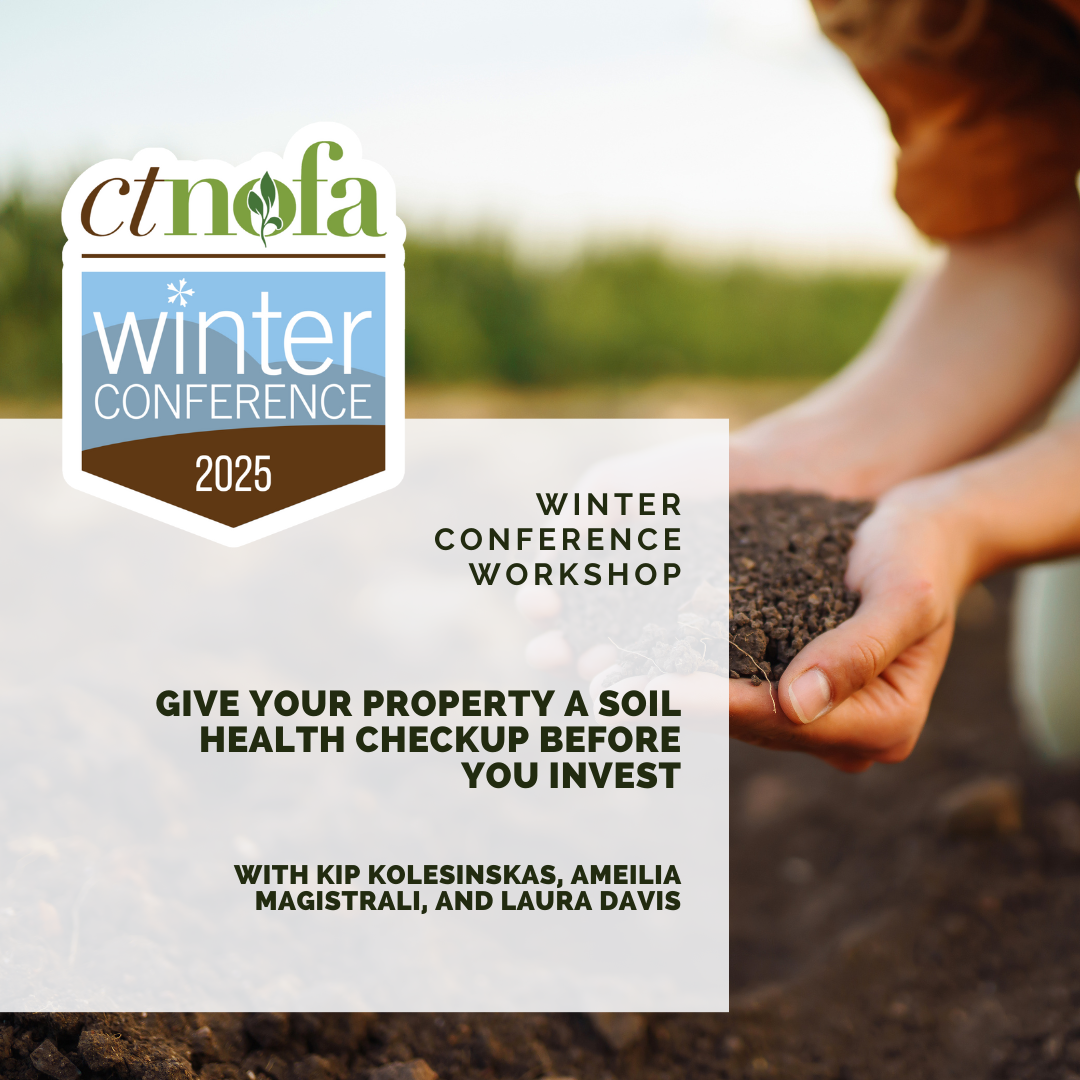
Give Your Property a Soil Health Checkup BEFORE You Invest
12:00 PM
KIP KOLESINSKAS, AMELIA MAGISTRALI, and LAURA DAVIS
Tracks: TBA
Join Soil Health Experts Kip Kolesinskas and Amelia Magistrali from UConn, and Laura Davis, Soil Technical Advisor for NOFA Mass, as they cover various aspects of soil health to consider on a potential piece of land, along with management strategies to deal with these findings. By studying the inherent properties of your land, along with past history, vegetation, infrastructure, community support, and climate concerns, this team will help you evaluate a potential site; determining the soil’s health, and sharing specific conservation practices to help with remediation.
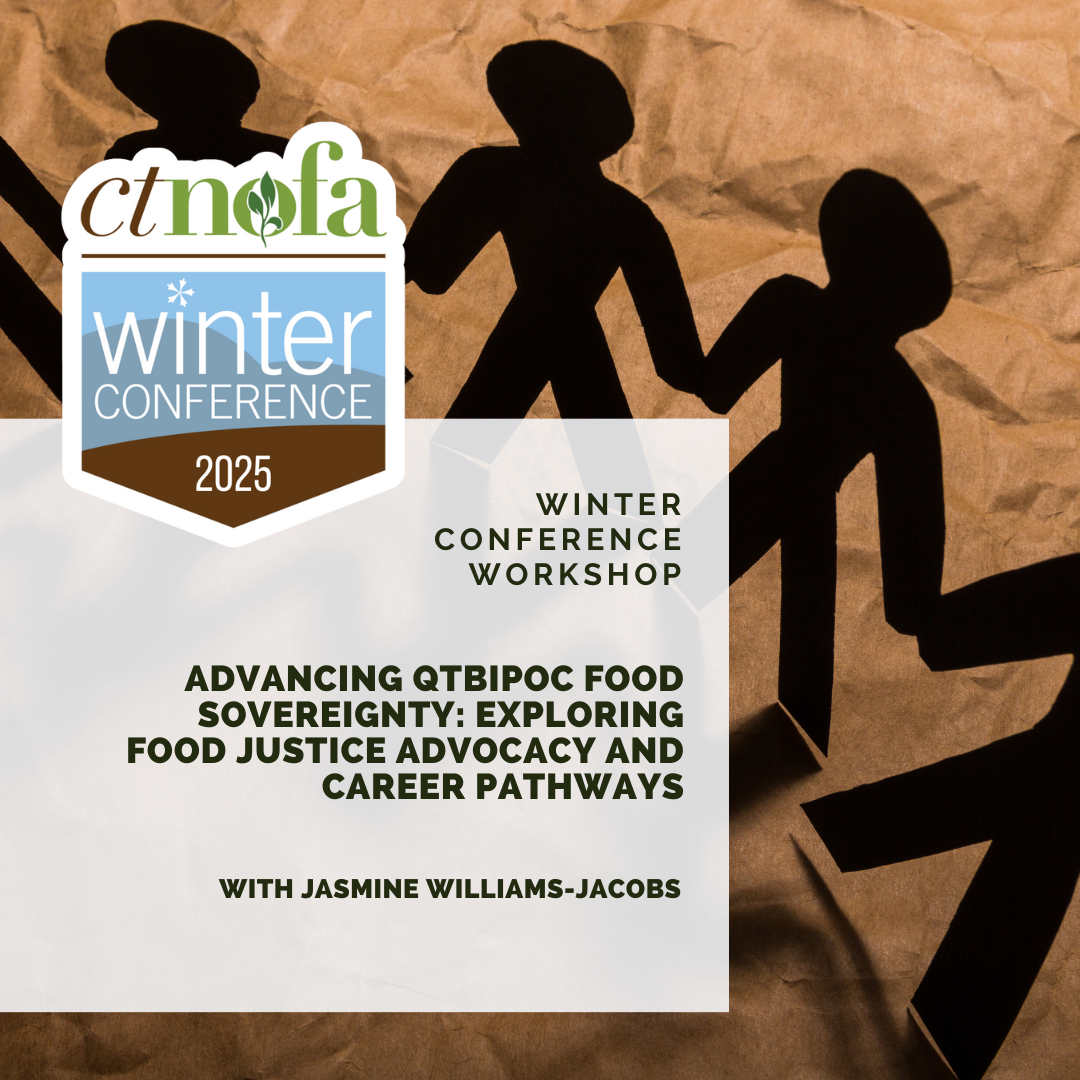
Advancing QTBIPOC Food Sovereignty: Exploring Food Justice Advocacy and Career Pathways
12:00 PM
JASMINE WILLIAMS-JACOBS | Black Remote She LLC
Tracks: Food Justice
This workshop will help attendees gain insight about career pathways and advocacy resources addressing food insecurity and advancing QTBIPOC food sovereignty. During the workshop, participants will be empowered with resources to help them engage with statewide, regional, and national food justice advocacy and mutual aid organizing efforts rooted in collective liberation. Additionally, participants will learn about career pathways and resources sustaining the food justice movement, including job networks, directories, and toolkits focused on building community power and an equitable food system. The end of the workshop will wrap up with a 15 minute Q&A to answer any questions related to food justice advocacy and careers.
february 26 (online)

National Family Farm Coalition – Challenges and Opportunities for a Farm Bill
9:00 AM
ANTONIO TOVAR | National Family Farm Coalition
Tracks: Policy and Advocacy
In this workshop, participants will gain valuable insights into the 119th Federal Legislation, with a specific focus on the Agriculture Committee members and their positions regarding the upcoming Farm Bill.
The session will equips participants with the knowledge and tools to navigate the complexities of federal legislation and advance your advocacy efforts, particularly those that the National Family Farm Coalition will be highlighting in the week: Fair Credit for Farmers Act, Farmland for Farmers Act, LOCAL Food Act, and the Mandatory Country of Origin Label Act.

How to Make Money with a Farm to Table Dinner
9:00 AM
ERIC FUCHS-STENGEL | National Center for Appropriate Technology
Tracks: Beginning Farmer
If you have fresh, local food and a beautiful farm, this is an ideal opportunity to generate additional income to diversify your revenue streams. Farm to Table dinners are an excellent way to build your customer base, gain brand loyalty, highlight your growing, and earn extra revenue. In this session you will learn the details of organizing a Farm to Table event, including preparing the farm grounds, creating the venue style, ordering the tableware, finding the right chef, discussing menu choices, processing payments, and marketing the event. This model works best for non-profits and community organizations but has relevancy for any small-scale commercial vegetable producers.
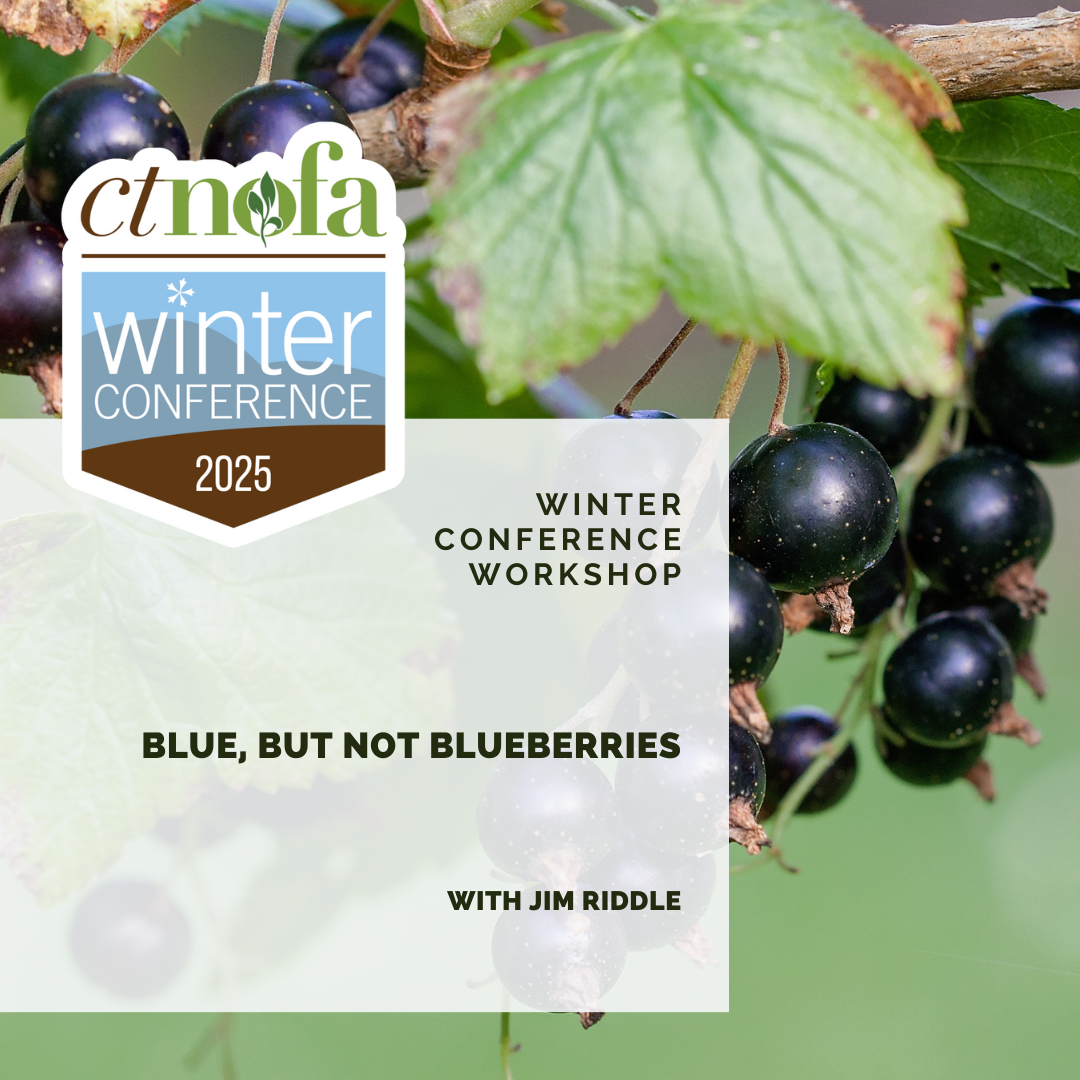
Blue, But Not Blueberries
12:00 PM
JIM RIDDLE | Blue Fruit Farm (MN)
Tracks: Transition to Organic Farming
This workshop will explore a variety of blue fruits that thrive in northern regions, beyond the familiar blueberry. Participants will learn about honeyberries, aronia berries, black currants, and elderberries, focusing on essential topics such as variety selection, growing requirements, and how to manage common pest and disease challenges. The session will also cover harvest techniques and the diverse range of products that can be made from these fruits, including jams, juices, and other value-added items. Attendees will have the opportunity to taste samples of jams and juices made from these nutritious and flavorful perennial blue fruits, gaining a deeper appreciation for their versatility and health benefits. Whether you’re a home gardener or small-scale farmer, this session will provide valuable insights into incorporating these hardy, productive fruits into your growing practices.
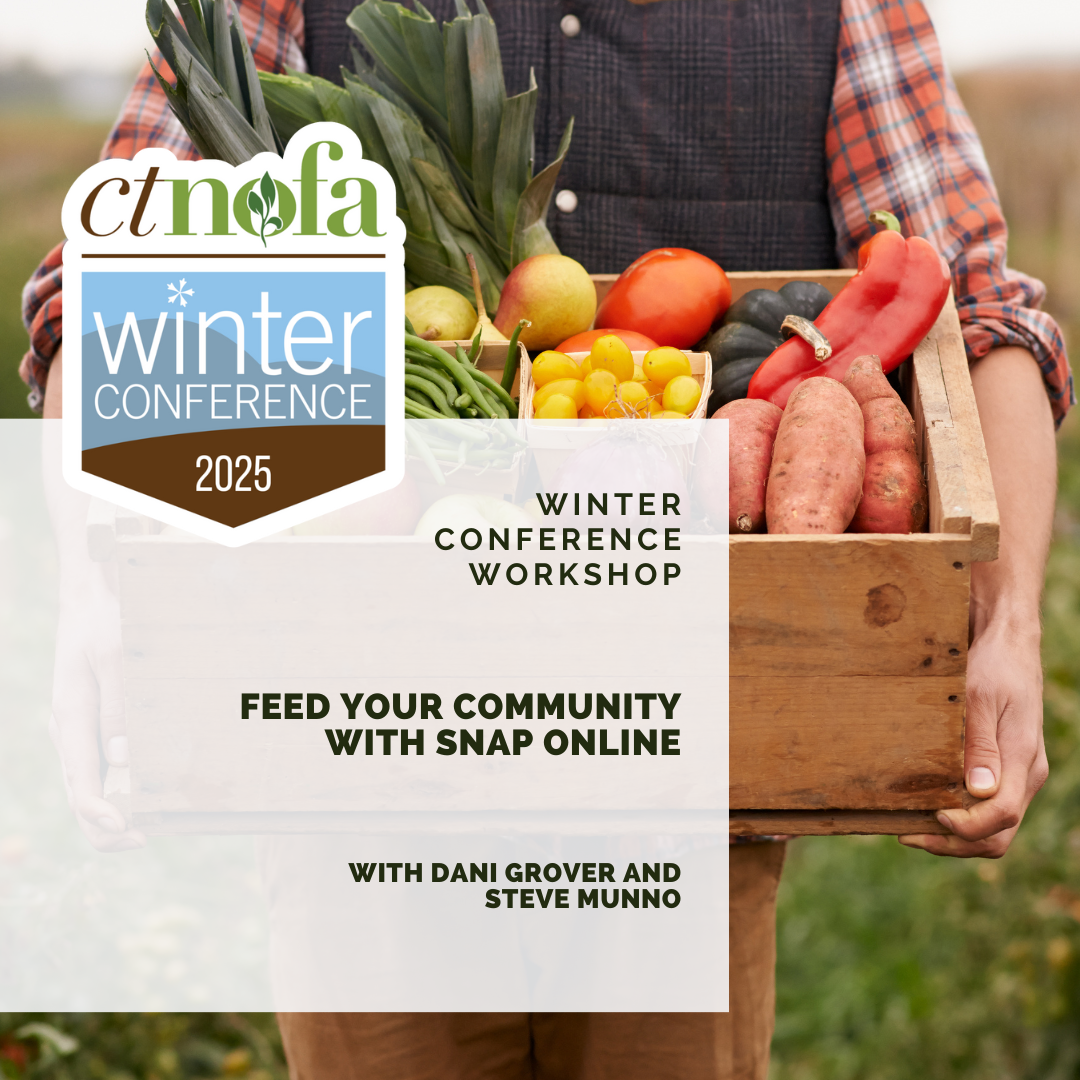
Feed Your Community with SNAP Online
12:00 PM
DANI GROVER and STEVE MUNNO
Tracks: Food Justice
Want to be able to accept SNAP/EBT payments for your CSA? Motivated to increase access to your food for all members of your community? Attendees of this workshop will learn how Hearty Roots Community Farm, a SNAP Online Certified Farm, has used the program to feed more members of their community through both CSA and retail sales. Attendees will leave with a clear understanding of the SNAP Online application process and how to begin their application.
february 27 (online)
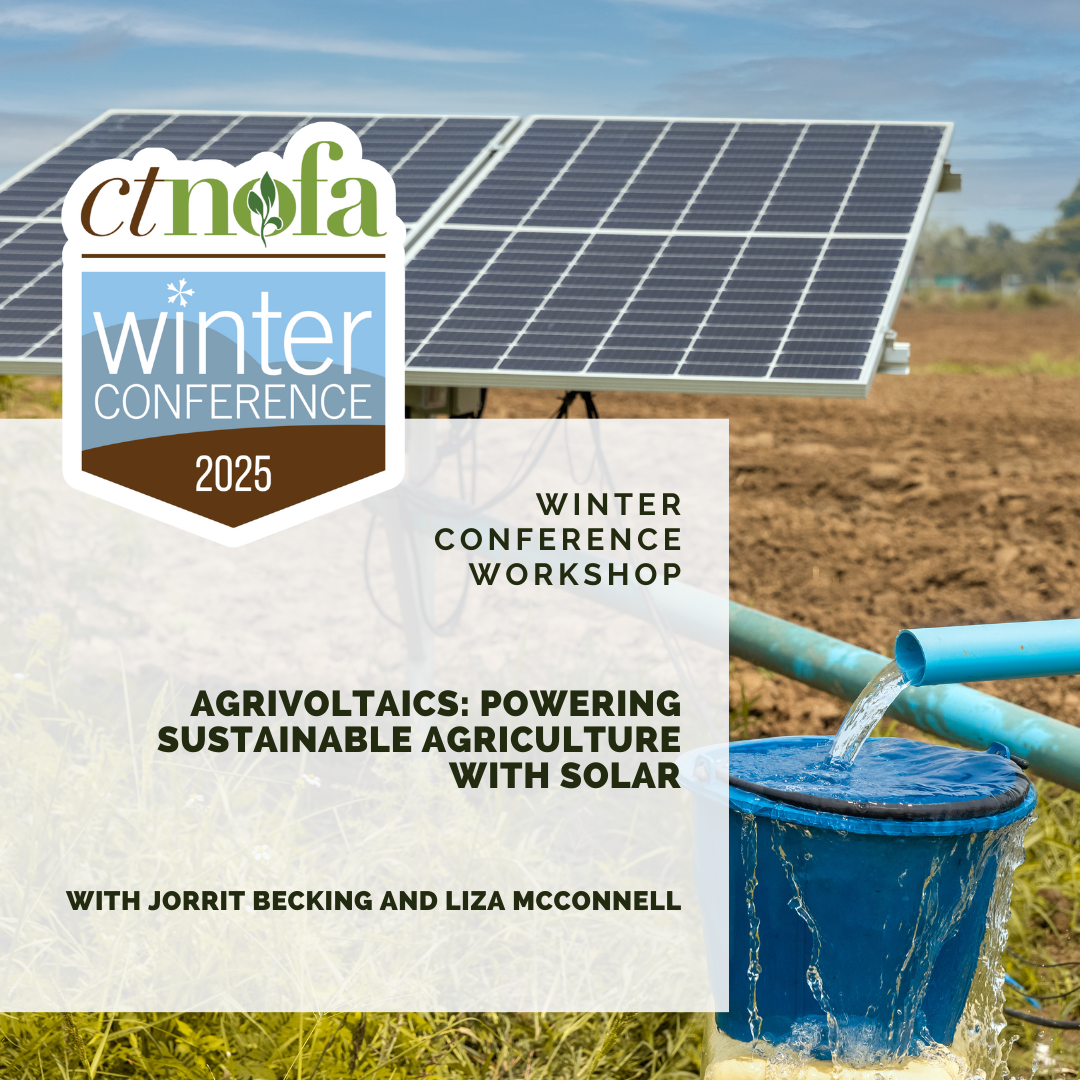
Agrivoltaics: Powering Sustainable Agriculture with Solar
9:00 AM
JORRIT BECKING and LIZA MCCONNELL
Tracks: Beginning Farmer
Farming and energy have been connected since the agricultural revolution, evolving from animal power to fossil fuels, and now renewables. However, solar energy’s rapid expansion often competes with farmland and food production, threatening agricultural communities. Agrivoltaics—a dual-use approach combining farming with solar—offers a promising solution by providing transition financing, higher lease payments, and income stability, particularly for organic and beginning farmers.
This workshop offers a farmer’s perspective on agrivoltaics, starting with an overview of system types: crop-integrated models, pollinator habitats, and livestock integration. It will explore design, implementation, regulations, and key considerations such as crop productivity, yield impacts, animal welfare, and equipment access, while also addressing synergies and challenges specific to organic agriculture.
The second part of the workshop will focus on practical insights from Sprout City Farm, an organic agrivoltaic CSA farm in Colorado where the agrivoltaics model was successfully implemented. Liza, the presenter and a devout proponent of organic agriculture, played a key role in launching and managing the farm, overseeing everything from the first planting season to marketing strategies and logistics. She will provide a transparent overview, sharing both successes and challenges, along with key lessons learned. Her presentation will cover practical aspects such as crop rotations, soil fertility management, and equipment use, from her time at the farm, offering an experience-driven perspective.
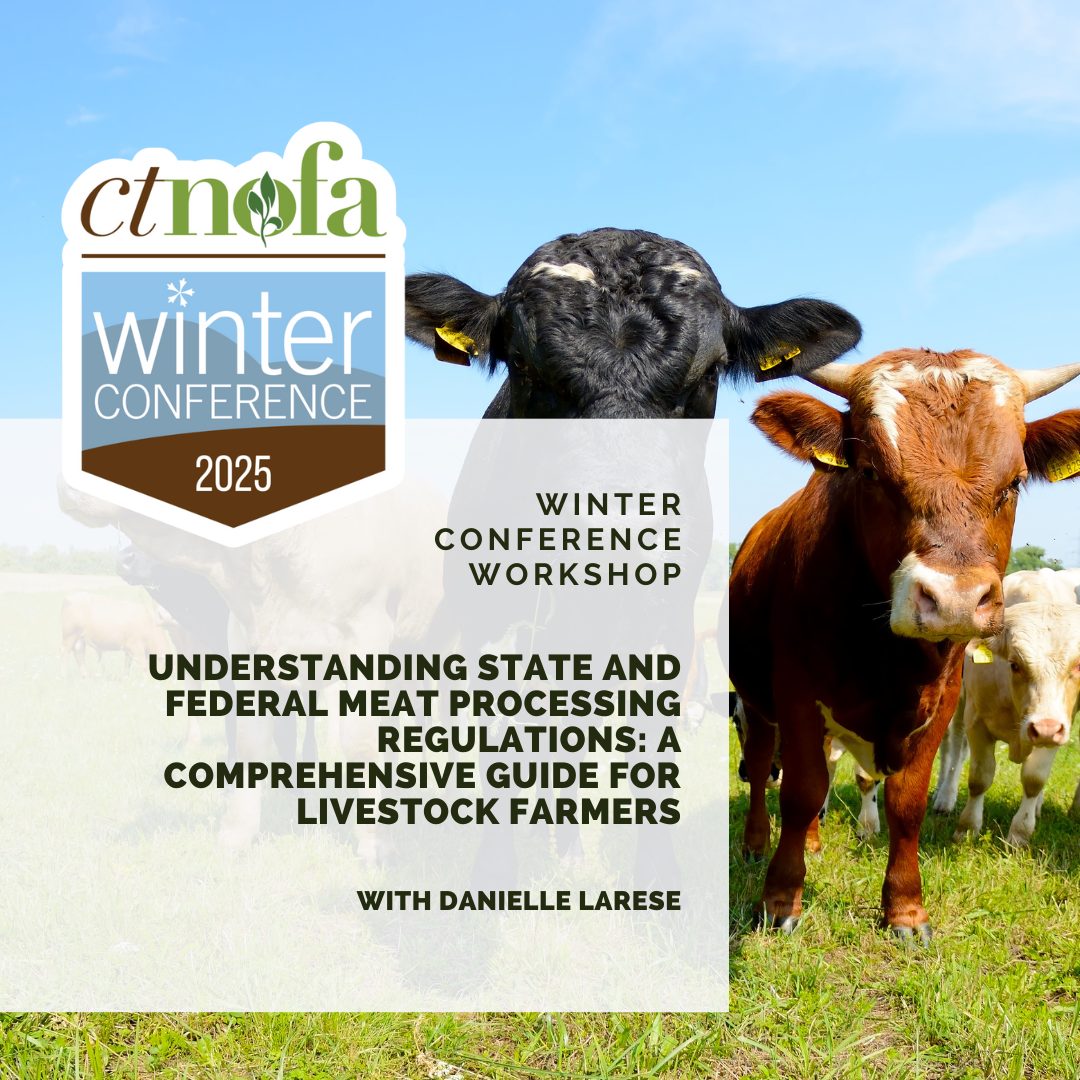
Understanding CT State and Federal Meat Processing Regulations: A Comprehensive Guide For Livestock Farmers
9:00 AM
DANIELLE LARESE | BOTL Farm
Tracks: Beginning Farmer
Whether you’re considering becoming a livestock farmer, have recently started, or have been raising livestock for many years, the complex regulatory maze around meat processing can seem daunting. What needs to be USDA inspected? Can I make my own sausages? We’ll discuss how to navigate this intricate landscape by addressing both Connecticut-specific mandates and federal guidelines. Then we’ll look at examples and case studies so your farm not only meets legal requirements but consistently offers safe and high quality meats for your customers.
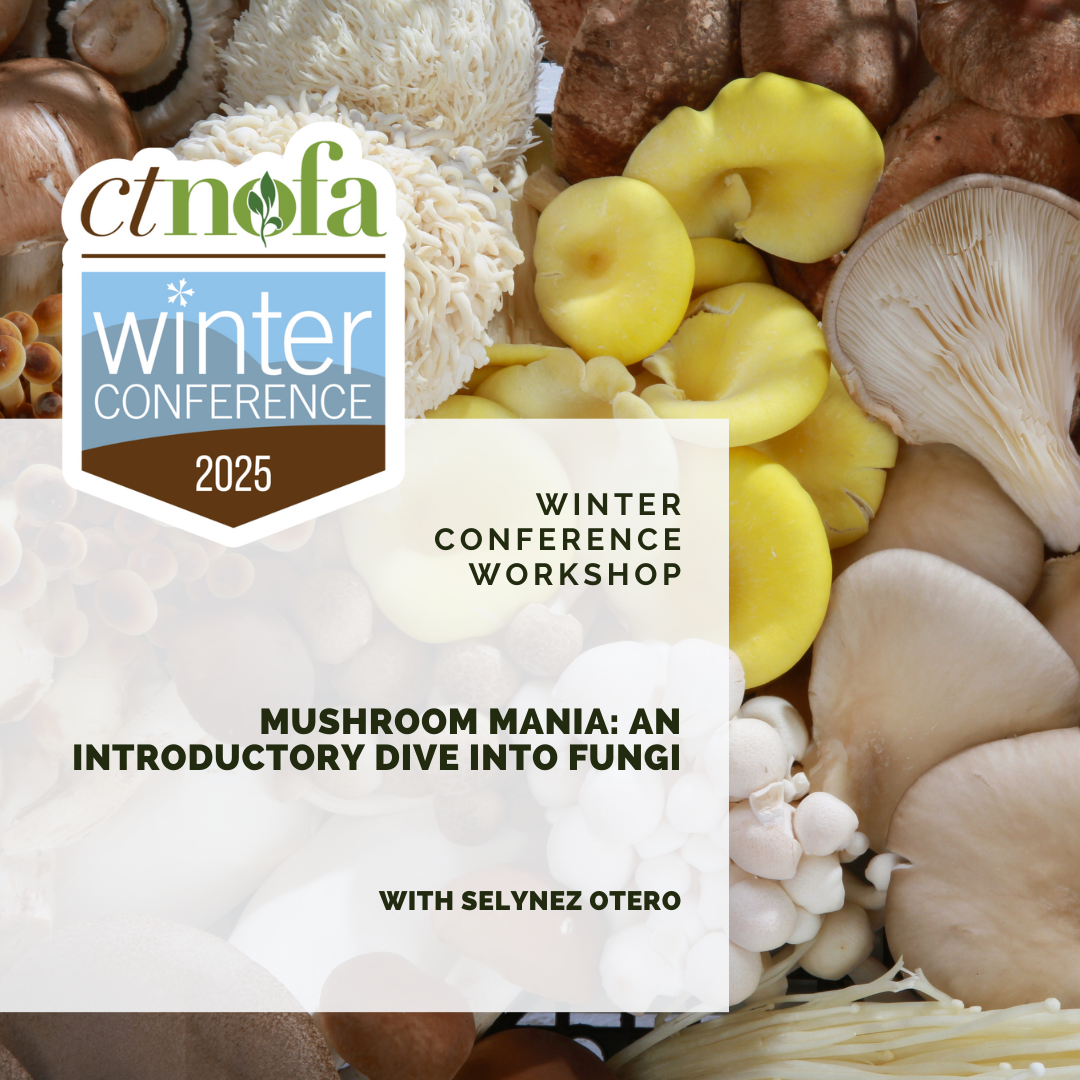
Mushroom Mania: Introductory Dive Into Fungi
12:00 PM
SELYNEZ OTERO | Root Life
Tracks: Beginning Farmer
Participants will learn the basics of fungi biology and ecology, including:
- Learn how to identify common mushrooms and fungi.
- Gain practical skills for foraging (safely and responsibly).
- Develop a basic knowledge of mushroom cultivation.
- Understand the ecological and medicinal importance of fungi.
Additionally, participants will learn how to grow their own mushrooms at home, including different techniques for different species and beginner-friendly mushroom cultivation.
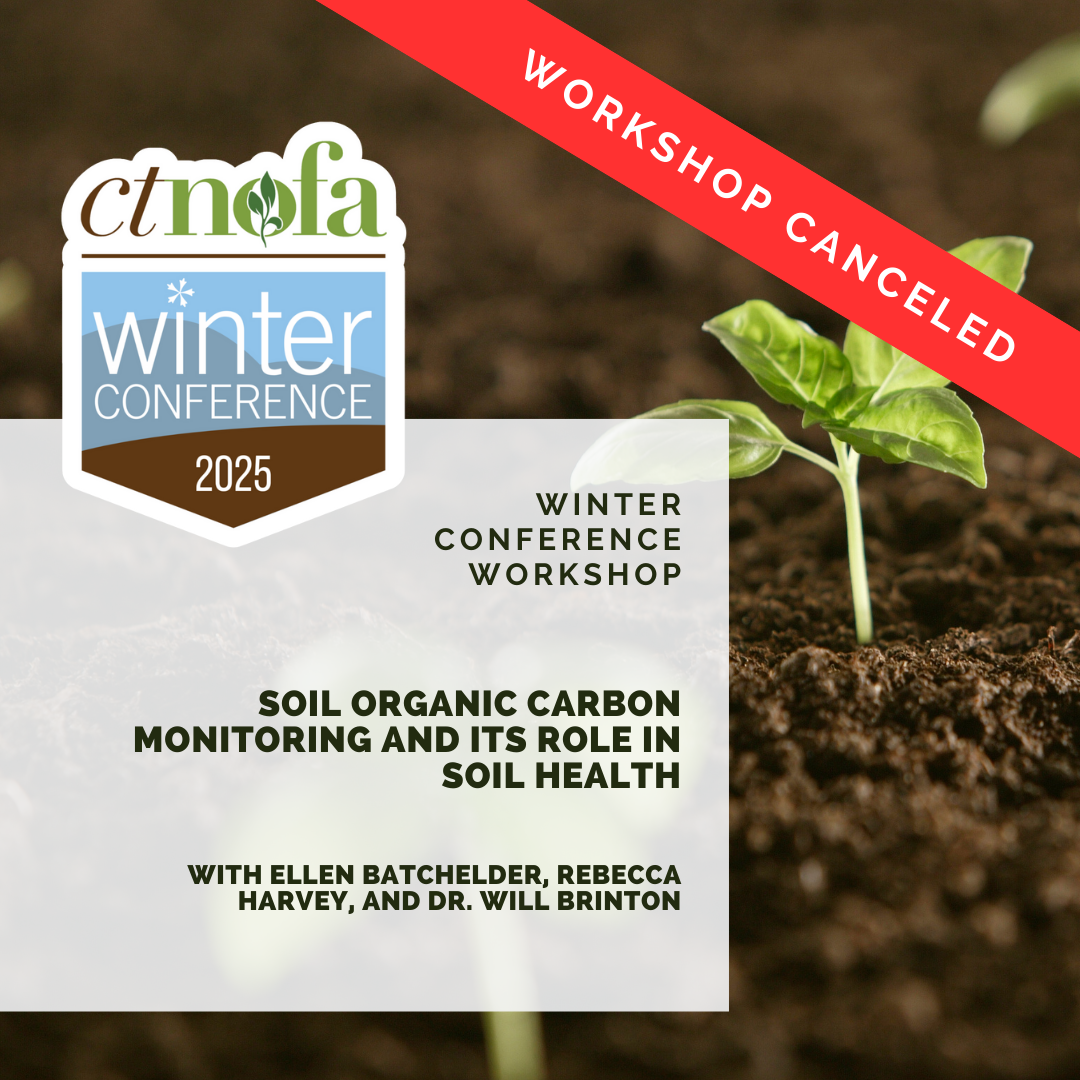
Soil Organic Carbon Monitoring and its Role in Soil Health
12:00 PM
DR. ELLEN BATCHELDER, DR. REBECCA HARVEY, and DR. WILL BRINTON
Tracks: Transition to Organic Farming
Regrettably, due to ongoing federal funding freezes and recent executive orders, the Soil Organic Carbon Monitoring workshop has been canceled.
If you would like more information about challenges, such as these, that farmers and farming support organizations are facing, we invite you to attend other workshops from our Policy and Advocacy track. If you have personally faced challenges related to federal funding freezes and/or executive actions, we encourage you to share your story, here.
March 1 (in-person at Eastern Connecticut state University)
events, clinics, & gatherings
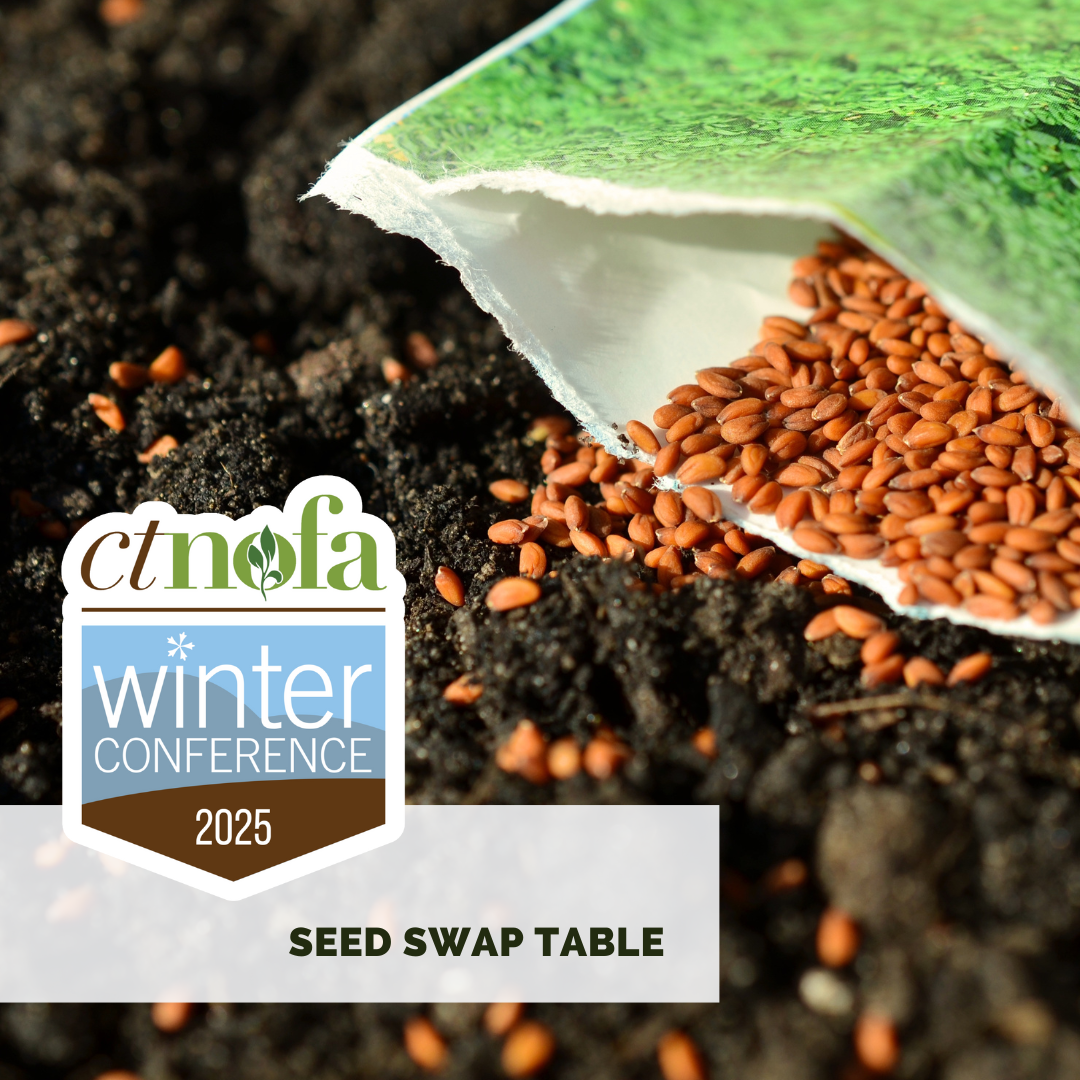
Seed Swap Table
ALL-DAY
Participant Led
Tracks: N/A
The Seed Swap Table is where conference attendees can exchange seeds, and diversify their gardens and farms with unique and regionally adapted varieties. The swap is open to all conference participants, from home gardeners to experienced growers. Participants are invited to bring labeled seeds to share and take home new seeds to try. The swap operates on a trust-based, give-and-take system—bring what you can and take what sparks your interest.
HOW IT WORKS
Bring Seeds to Share (If You Can)
If you have extra seeds, label them clearly with the variety, year harvested, and any growing notes. Organic, untreated, and non-GMO seeds are encouraged.
Browse & Take Seeds
Look through the available seeds and take what interests you. Use the provided empty packets and measuring spoons to portion seeds responsibly — leave enough for others!
Label & Leave Seeds for Others
If you’re contributing seeds, make sure they are labeled. Blank packets are available if needed. Place your seeds on the table for others to find.
Ask Questions & Share Knowledge
Not sure what to take? Ask a fellow attendee! This is a great place to learn about new varieties and growing techniques.
Enjoy & Grow Something New!
Take your seeds home and plant them! If you have extra seeds left at the end, consider leaving them to share with others beyond the conference.
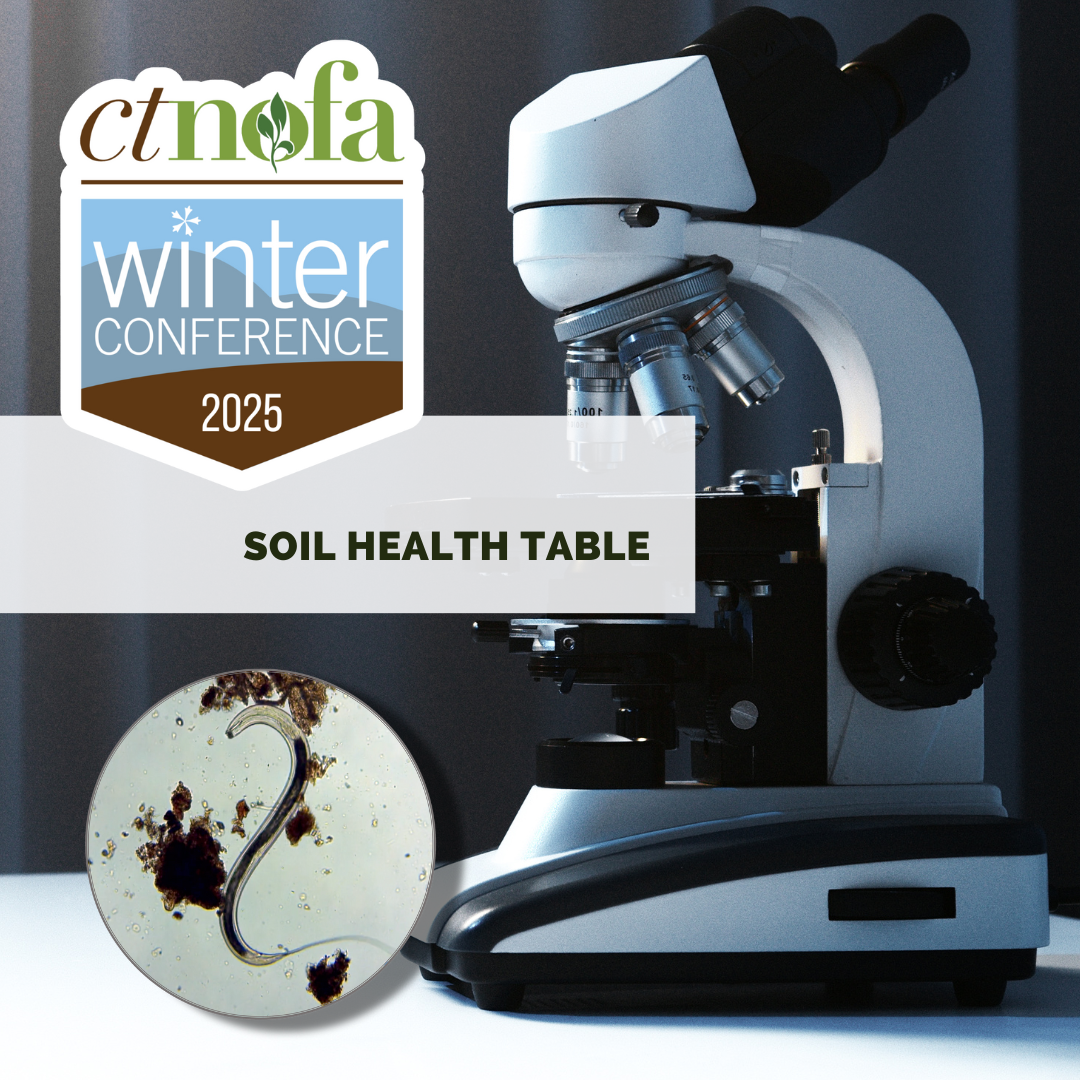
Soil Health Table
ALL-DAY
CT NOFA STAFF
Tracks: N/A
Throughout the conference, we will have our soil health table set up. We hope you’ll stop by to learn more about what healthy, living soil looks like. Bring a soil or compost sample! We’ll put it under the microscope, identify the microbial life within, and explain what it all means. We will also have information about upcoming microscopy courses and trainings, so you can learn to analyze, amend, and improve your own soil and compost, on your own time. Come talk with us about this exciting new program, which includes a microscope and all the materials you need to see the life in your own soil and compost.
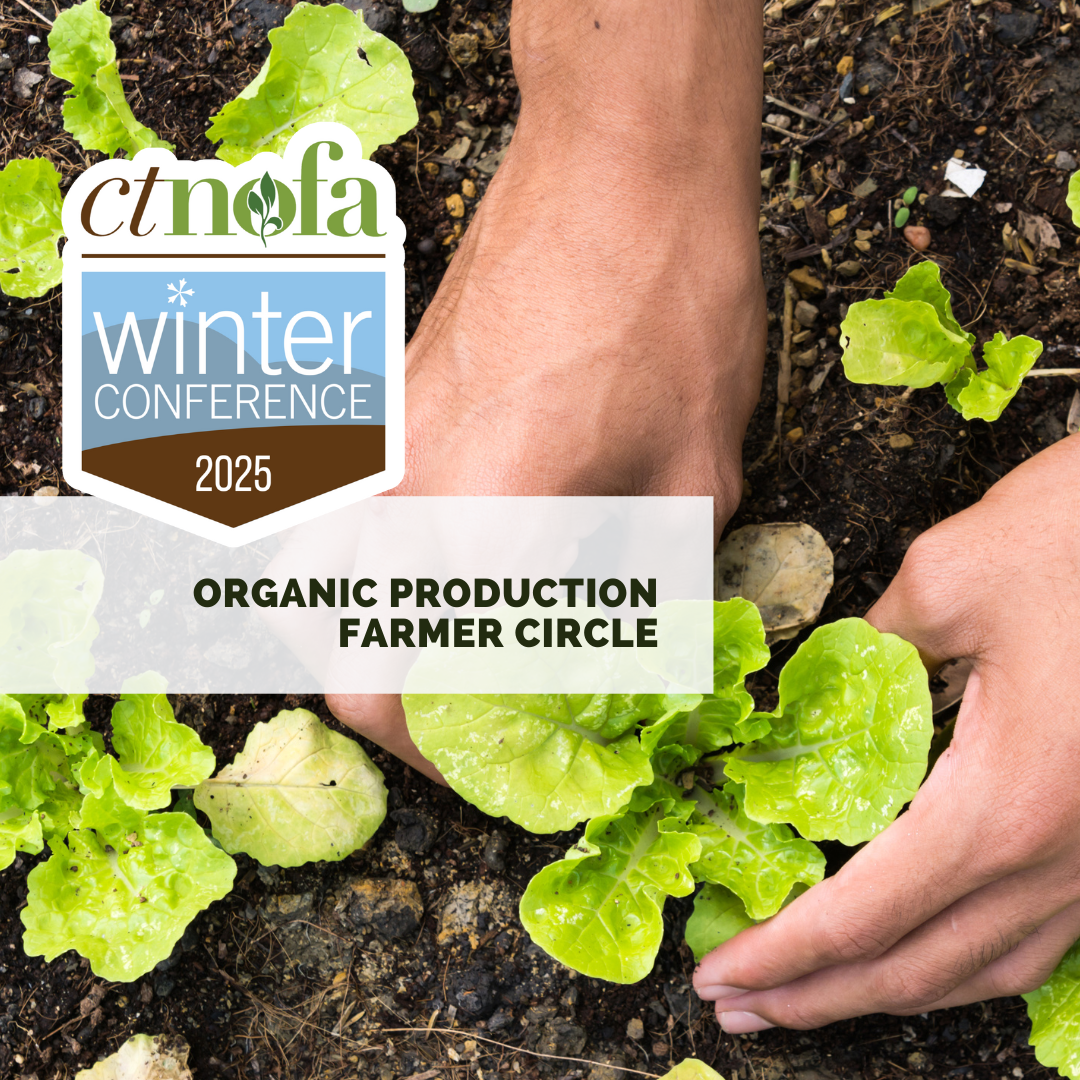
Organic Production Farmers Circle
LUNCH
Led by SUSAN MITCHELL | Cloverleigh Farm
Tracks: N/A
Like-minded individuals from across our region rarely have the time to come together during the growing season. The CT NOFA Winter Conference offers them the chance to connect for both social and professional reasons.
Join a community of farmers dedicated to organic production. Whether you’re certified organic, in transition, or exploring adopting an organic system, this space is for sharing insights, troubleshooting challenges, and learning from fellow producers who are committed to strengthening the future of organic agriculture together.
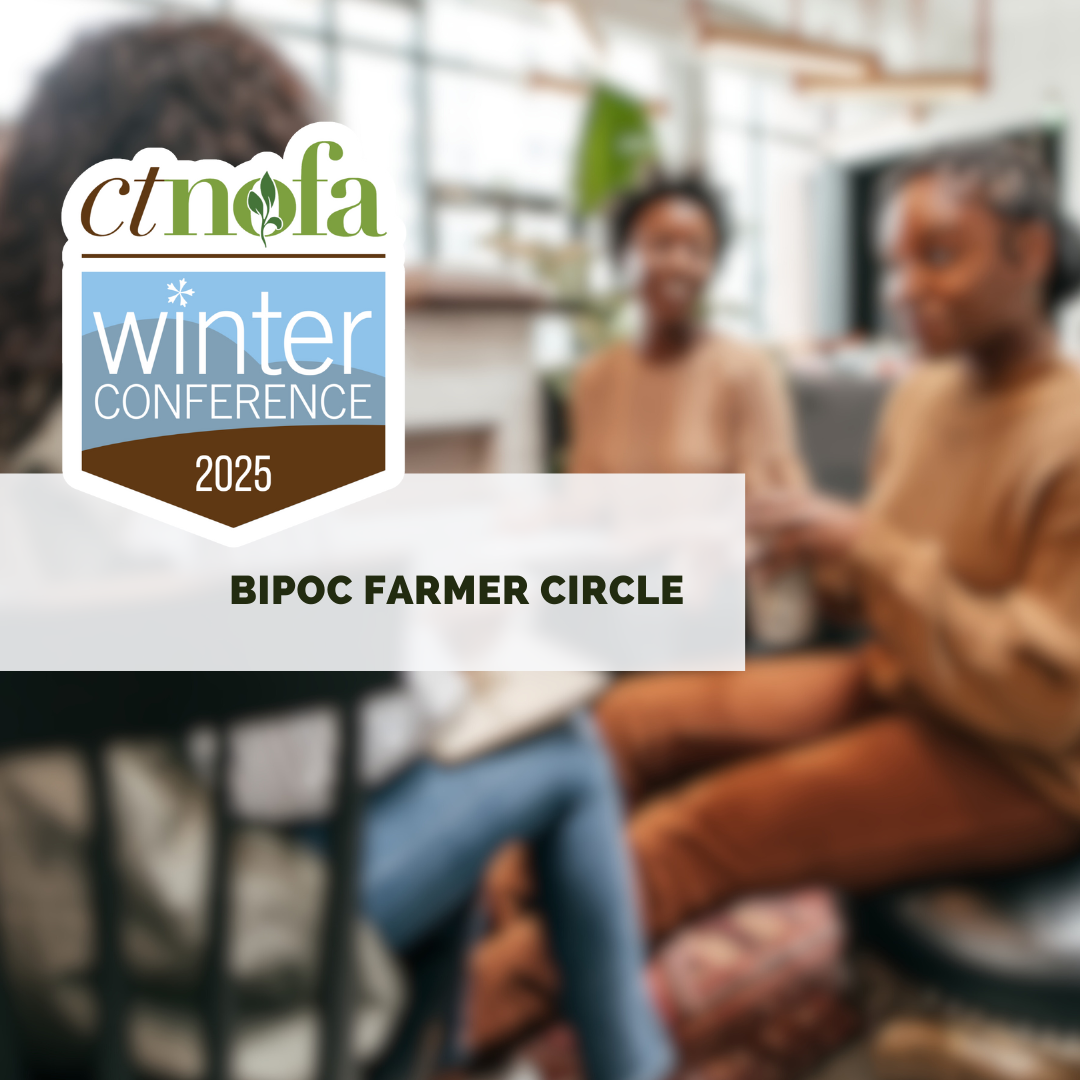
BIPOC Farmers Circle
LUNCH
Led by AZEEM BLESSINGS KAREEM | Samad Gardens Initiative
Tracks: N/A
Like-minded individuals from across our region rarely have the time to come together during the growing season. The CT NOFA Winter Conference offers them the chance to connect for both social and professional reasons.
Join fellow Black, Indigenous, and People of Color (BIPOC) farmers for a supportive and empowering space to share experiences, resources, and strategies for success. This circle is a place to build community, discuss challenges, and celebrate the resilience and knowledge that BIPOC farmers bring to the land and the local food system.
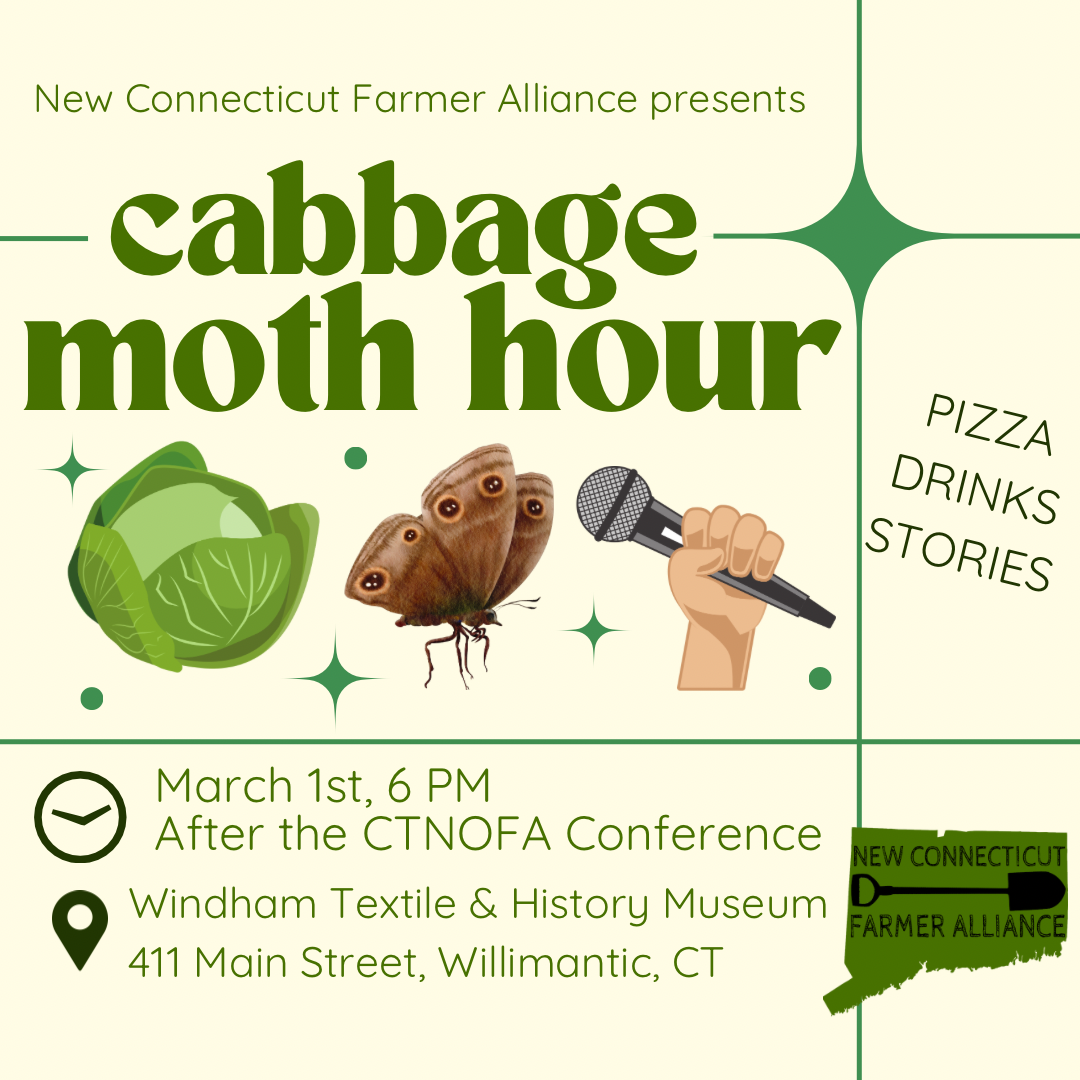
Cabbage Moth Story Hour After Hours Gathering
6:00 PM
Hosted by NEW CONNECTICUT FARMER ALLIANCE
Tracks: N/A
Join us after the conference for food, drink, and the New Connecticut Farmers Alliance famous Cabbage Moth Story Hour! Farmers are invited to take the stage and share a farm-related story: the time you had to chase your chickens across town, your craziest farm injury, your moment of agricultural inspiration, etc. Time limit is 8 minutes.
This gathering will take place at the Windham Textile Museum — a short drive from Eastern’s campus: 411 Main St., Willimantic CT, 06226
session 1 (9:45am-11:00am)
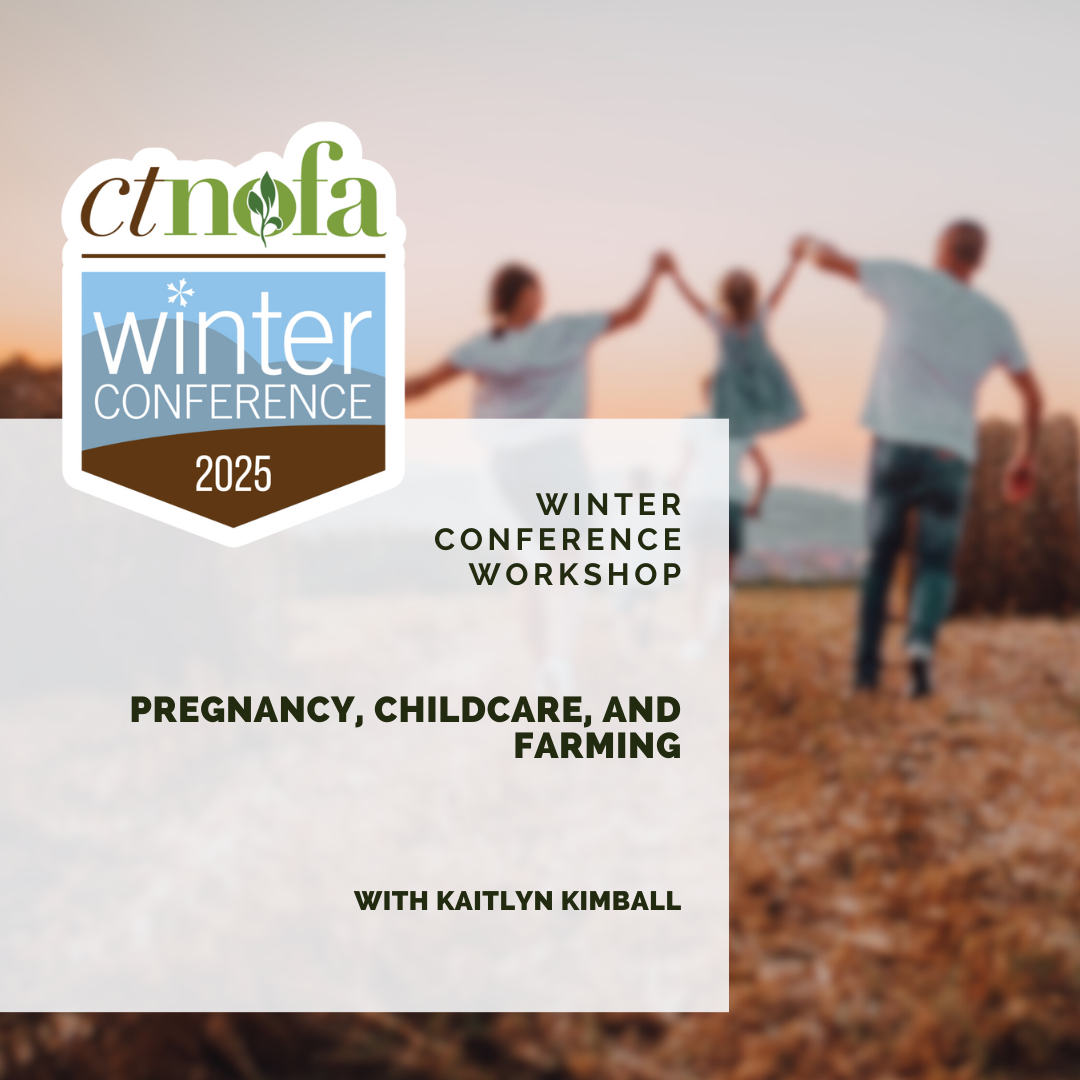
Pregnancy, Childcare, and Farming
9:45 AM
KAITLYN KIMBALL | Sunset Farm
Tracks: Beginning Farmer
This workshop will give participants a first hand view on my experience as a mother and USDA Certified Organic Farmer. Participants will learn about my experience of having two children within the last three years and what that entails – working while pregnant, planning for maternity leave, returning to work postpartum, and navigating childcare – all while owning and operating a farm. Farming is a unique profession, with specific seasonal physical and emotional demands. Many women feel that they have to step away from their farming operation or delay having children while farming. This presentation aims to educate women on actual experiences of other mother farmers and leave feeling prepared for their own maternal experience. The presentation will include anecdotes and tips from other female farmers in the Northeast, including women with older children. Participants who are interested in having children while farming, or farm owners who are interested in supporting their employees while pregnant and beyond, should attend this session to learn more about the physical and financial demands that having a child places on farmers. My hope is that women walk away feeling empowered and have realistic expectations for caring for a child while farming.
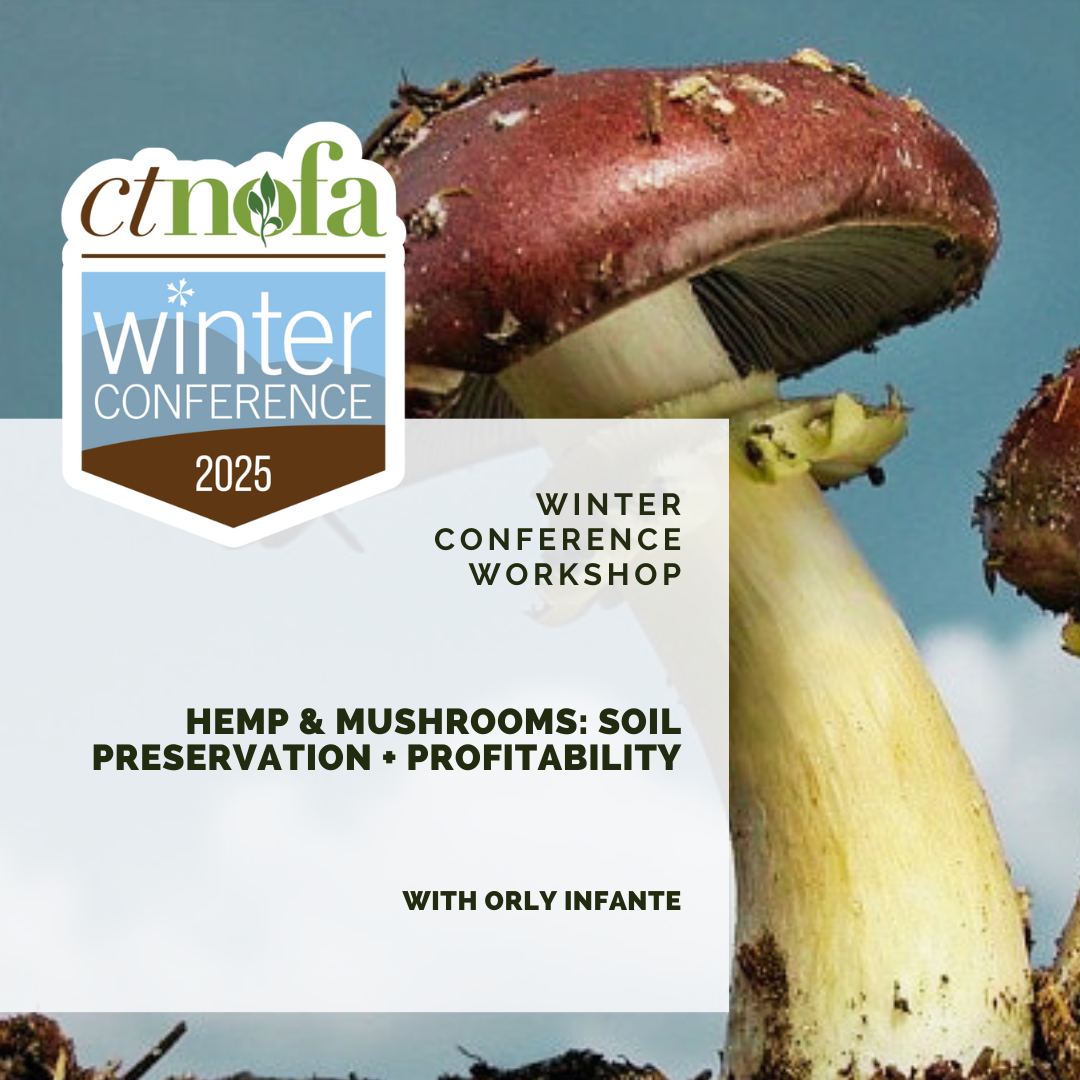
Hemp & Mushrooms: Soil Preservation + Profitability
9:45 AM
ORLY INFANTE and FREEDOM GERARDO
Tracks: Beginning Farmer
Garden Giant mushrooms thrive in symbiosis with hemp, enhancing soil health in wetlands like those at SEAmarron Farmstead in Danbury, CT. Hemp’s deep roots aerate soil, while its decaying matter provides nutrients for the mushrooms. In return, the mushroom mycelium network improves water retention, suppresses pathogens, and increases nutrient availability for both plants. This synergistic relationship fosters a thriving ecosystem, minimizing the need for external inputs.
Furthermore, cultivating hemp alongside these giants offers multiple benefits. Hemp stalks, a byproduct of cultivation, can be used as a sustainable substrate for indoor/outdoor mushroom growth, as well reducing waste and creating a circular economy. The harvested CBD, known for its therapeutic properties, presents a valuable market opportunity.
Additionally, the large, flavorful Garden Giant mushrooms themselves can be sold as a gourmet delicacy, further increasing the economic viability of this integrated system. This approach not only revitalizes wetlands but also provides a sustainable model for local agriculture, promoting economic growth and environmental stewardship.
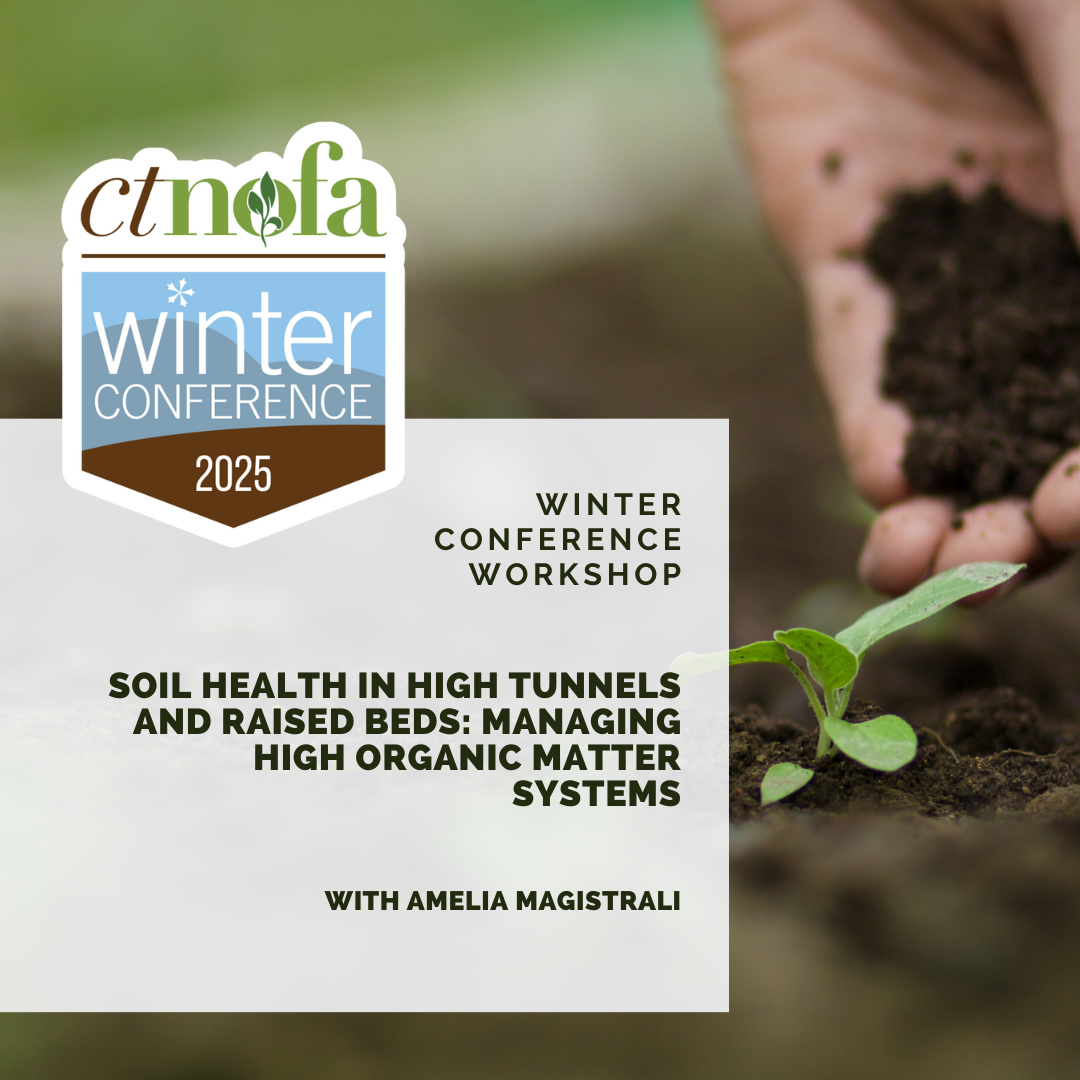
Soil Health in High Tunnels and Raised Beds: Managing High Organic Matter Systems
9:45 AM
AMELIA MAGISTRALI | UConn Extension
Tracks: Transition to Organic Farming
This workshop will focus on soil health and soil testing considerations for growing in high tunnels and raised beds, with an emphasis on organic matter. Managing potential high organic matter systems is of interest for many reasons, including the growth of opportunities for high tunnel production through climate-smart funding and the increase in soil samples with high organic matter content received by soil labs in the Northeast. The session will present results from a UConn Extension soil sampling pilot, provide some initial soil health recommendations, and allow for input into further resources and research of relevance to farmers.
Participants will learn about the results of soil analyses from high tunnels and raised beds from autumn 2024 from Connecticut farms, including how the information and experience will be used to develop further testing capability at the UConn Soil Lab for high organic matter samples. Initial recommendations will be shared, focusing on strategies to maintain optimal soil health and emphasizing how these systems can both benefit from and be challenged by high organic matter content. Guidance for soil testing, including when and why to consider requesting a different type of analysis based on high organic matter content, will also be presented.
The workshop will conclude with an opportunity for discussion, allowing participants to share their experiences of managing high tunnel and raised bed systems and suggest opportunities for further resource and research needs for advancing soil health in organic high tunnel and raised bed systems.
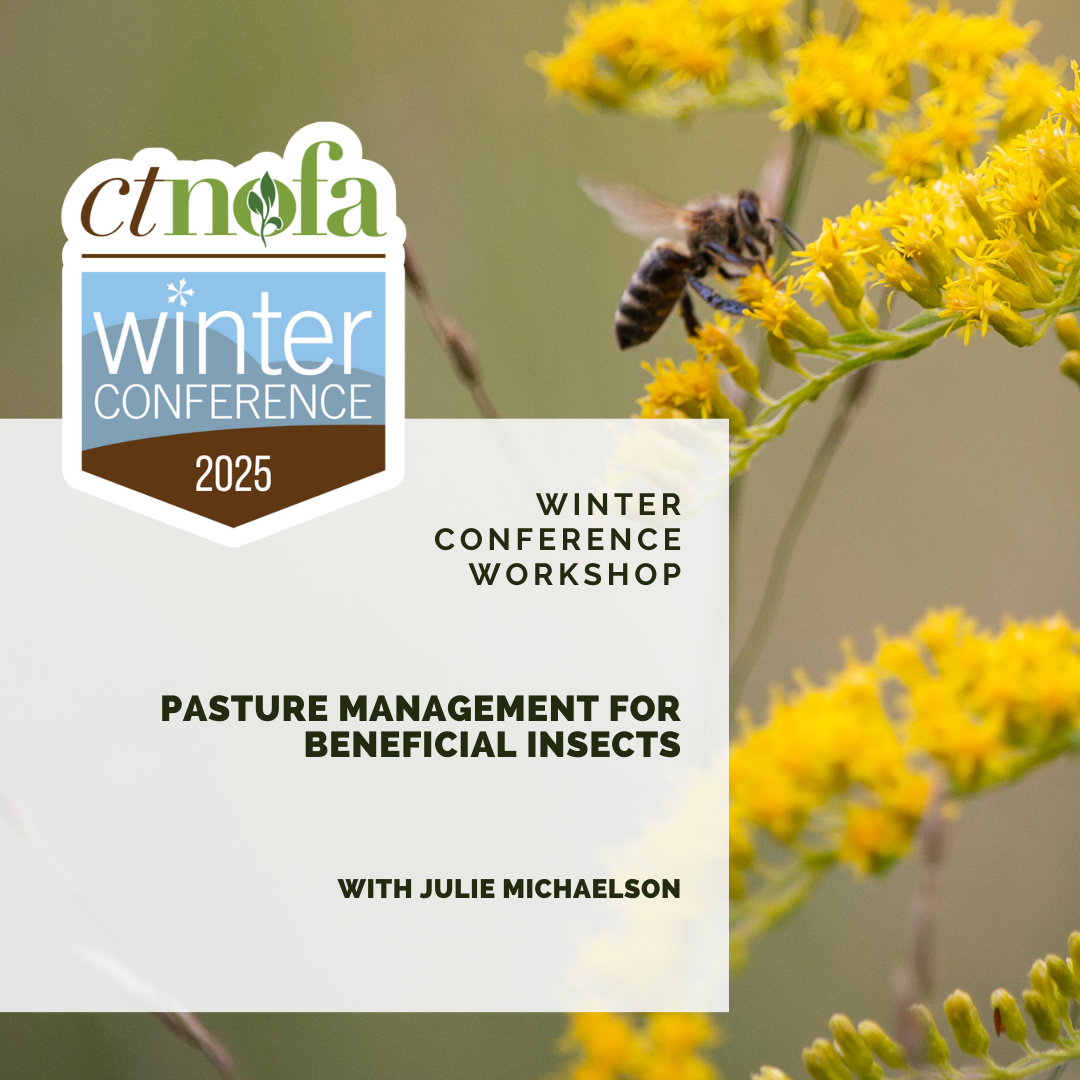
Pasture Management for Beneficial Insects
9:45 AM
JULIE MICHAELSON | Xerces Society for Invertebrate Conservation
Tracks: Organic Land Care
This presentation will teach participants about the habitat needs and management benefits of conserving insects like pollinators, dung beetles, and predators/parasitoids of pests in pasture and silvopasture systems. Discussion will cover the role of beneficial insects (pollinators, decomposers, and predators/parasitoids of pests) in livestock operations and the habitat/management practices that support them, as well as an introduction to tools and methods for monitoring and identifying signs of beneficial insects. We will also more broadly cover habitats and design considerations that support pollinators/other beneficial insects outside of areas livestock use, such as forests, forest edges, and vegetative buffers around ponds or rivers (really, any place where there is some flowering resource), so there will be something for everyone to take away.
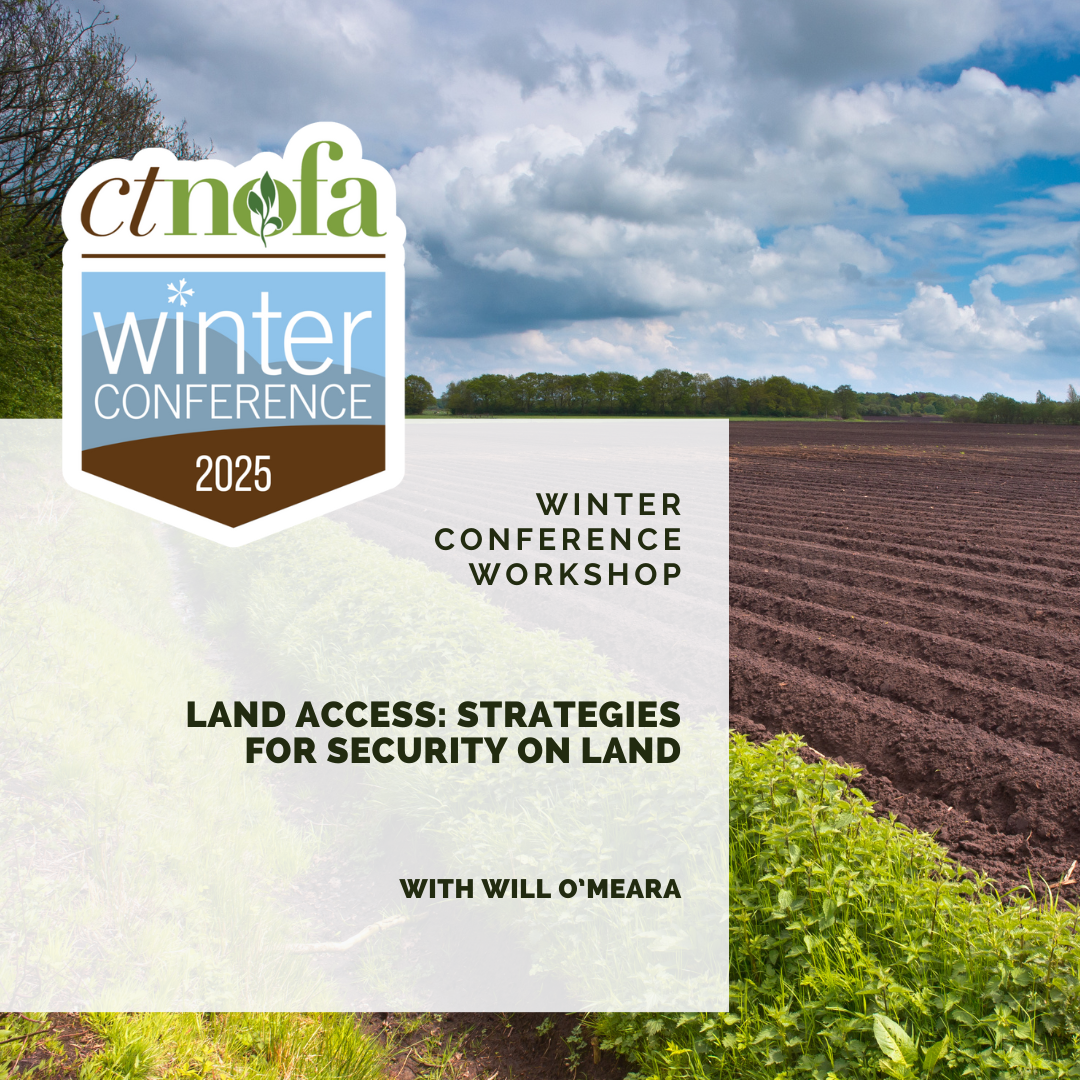
Land Access: Strategies for Security on Land
9:45 AM
WILL O'MEARA | Land for Good
Tracks: Beginning Farmer
Land access is among the top issues facing new and beginning farmers as they kick start their careers in agriculture. A challenging and expensive real estate environment and the scarcity of farmland seem to make finding farmland more challenging each year. In this workshop, attendees will learn about how to conduct a land search, how to assess farmland and infrastructure, the pros and cons of leasing vs. owning farmland, and strategies for making farmland more affordable. We will also discuss resources available to farmers to improve land access outcomes, financing options, and concrete steps farmers can take to improve their readiness for leasing or purchasing farmland. Will O’Meara, the CT Field Agent with Land For Good and owner/operator of Hungry Reaper Farm in Morris, CT, will draw heavily on his personal experiences looking for land, and a series of leases that led them to move their farm three times in three years. Case studies from other farms in the region will complement the topics and strategies discussed.
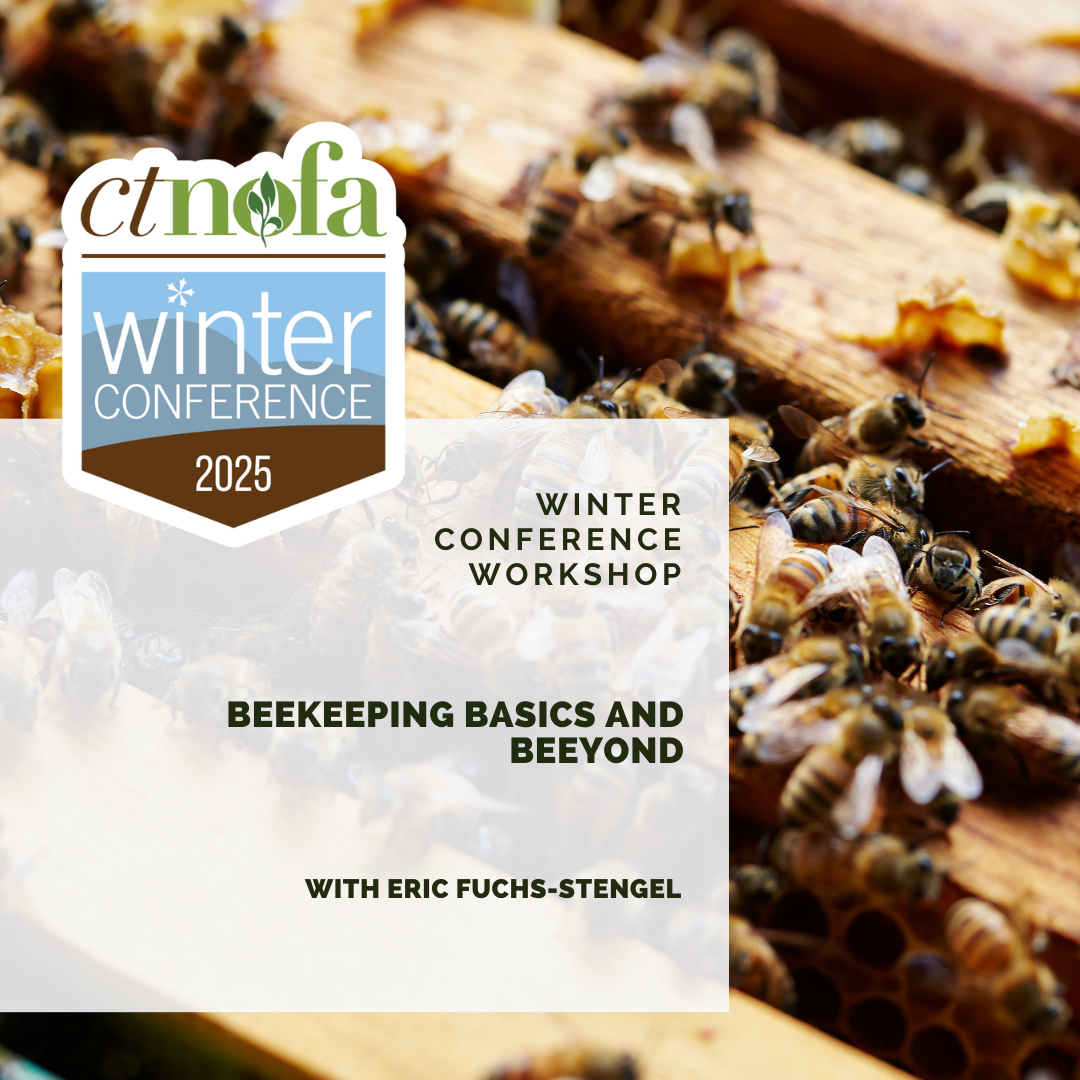
Beekeeping Basics and Beeyond
9:45 AM
ERIC FUCHS-STENGEL | National Center for Appropriate Technology
Tracks: Homesteader/Gardener
Honeybees can be a great addition to your farm and life but are challenging to raise successfully. These special insects can increase annual crop yield, inspire your farm team, and provide you with energizing honey. In this session we will cover the fundamentals of beekeeping such as hive placement, varroa and pest management, as well as honey production and winter survival.
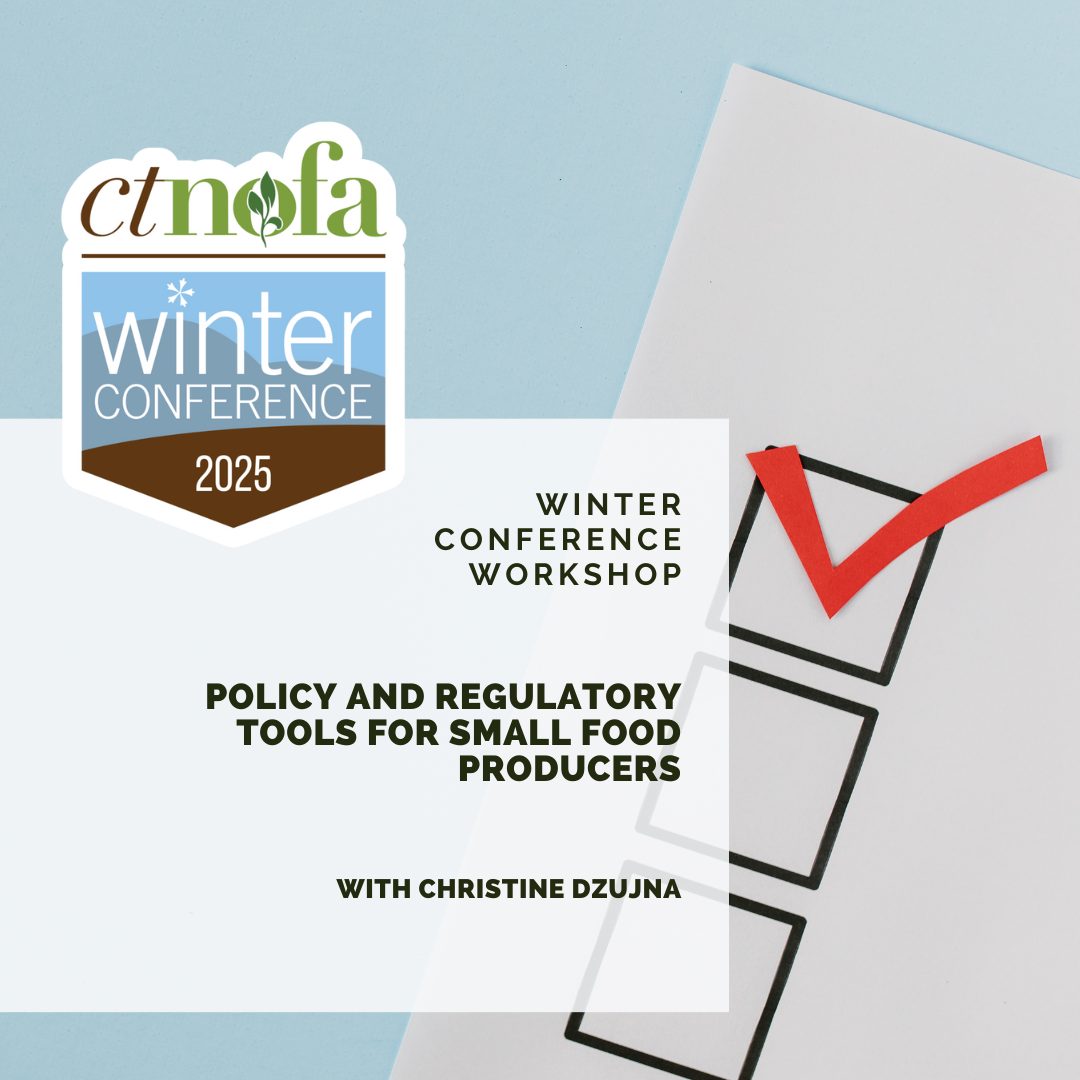
Policy and Regulatory Tools for Small Food Producers
9:45 AM
CHRISTINE DZUJNA | Farm-to-Consumer Legal Defense Fund
Tracks: Policy and Advocacy
Farmers, homesteaders, artisans, and cottage food makers have the right to produce the food they want, and consumers have the right to purchase what they want to feed their families. However, laws and regulatory overreach often restrict these choices. This workshop will explore key federal, state and local meat, poultry, raw milk, cottage food, and other regulations that impact small food producers, and the legal solutions that can help them remain viable and grow. You will also explore legislative, policy, and advocacy tools that seek to expand food freedom choice for everyone.
Audience members will be invited to share regulatory overreach stories and challenges so that we can workshop approaches and solutions.
session 2 (11:15am-12:30pm)
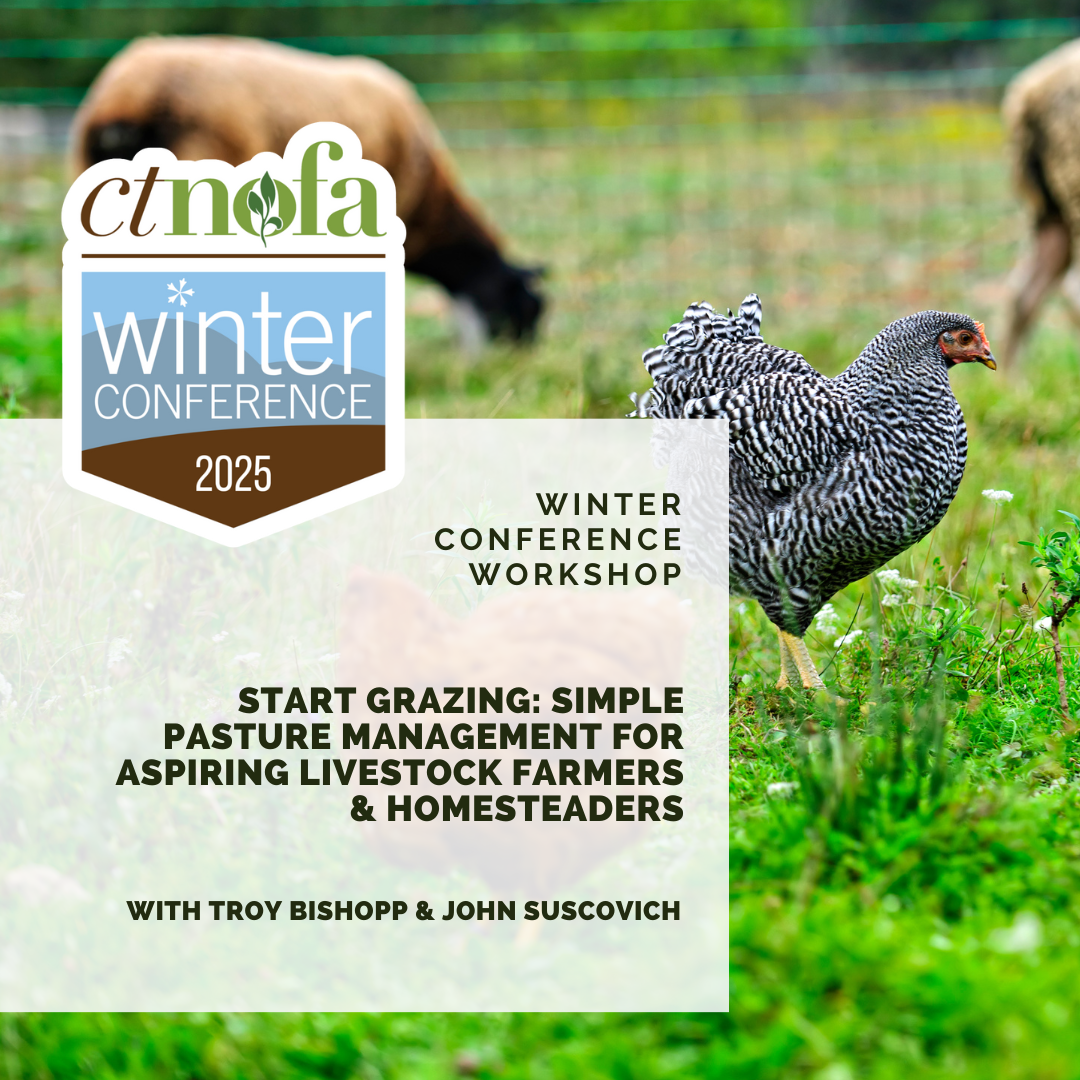
Start Grazing: Simple Pasture Management for Aspiring Livestock Farmers & Homesteaders
11:15 AM
TROY BISHOPP and JOHN SUSCOVICH
Tracks: Homesteader/Gardener
This session will introduce simple, practical tools for beginning farmers in reading the land and making grazing decisions at any scale. From beef, small ruminants and pastured poultry, learn that grazing planning is approachable and you can be self-sufficient in the process of managing your operation. We’ll tackle the whys,’ hows,’ and see tangible results from actual farmers who have adopted organic, holistic, planned grazing processes. Bring your goals, maps, and animal numbers and be an interactive participant in learning to chart a path to success.
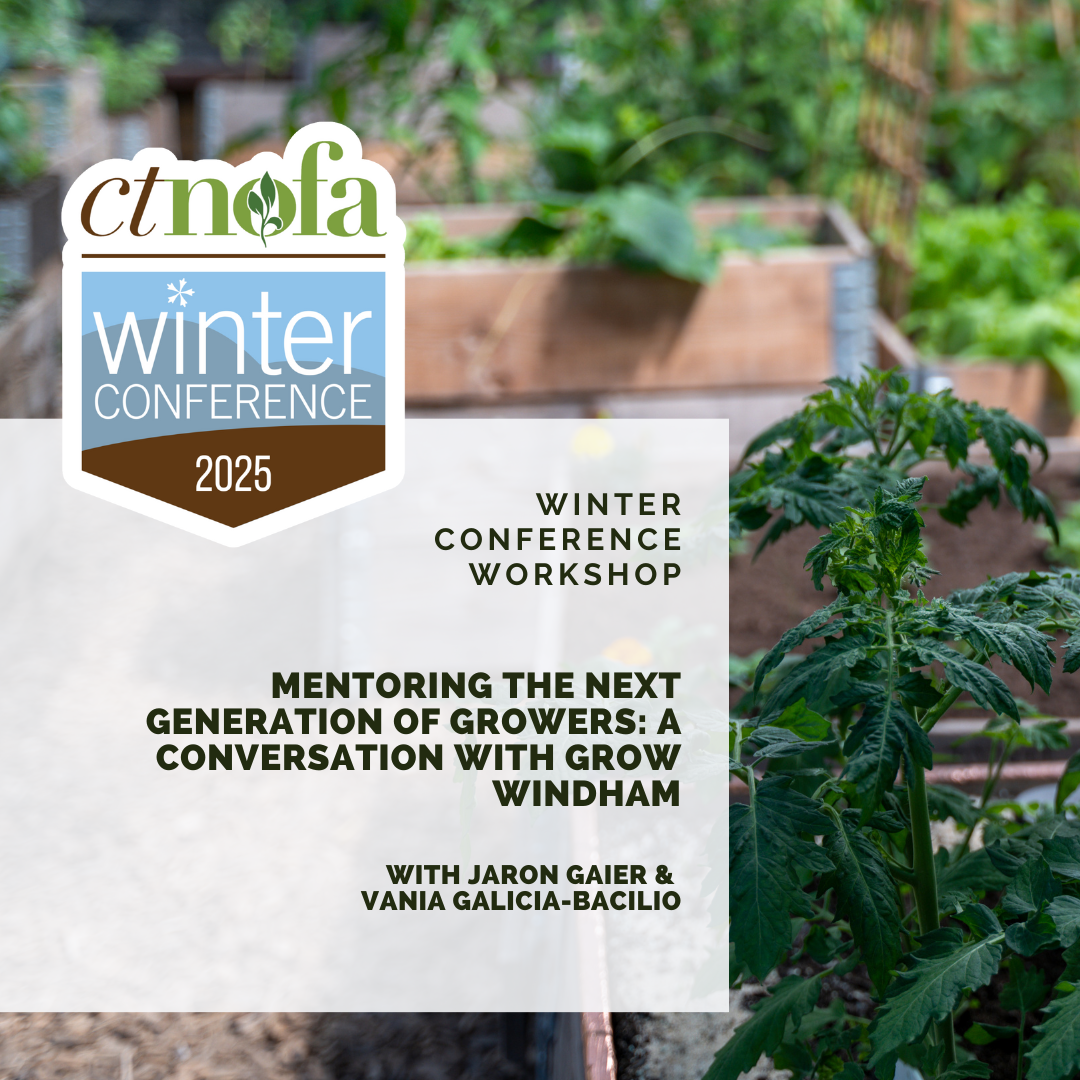
Mentoring the Next Generation of Growers: A Conversation With GROW Windham
11:15 AM
JARON GAIER and VANIA GALICIA-BACILIO | GROW Windham
Tracks: Food Justice
In this session, GROW Windham staff will share what strategies and practices they have implemented in their urban agriculture programming to help their youth members step into larger leadership roles within the organization and their gardens. The session will focus on how to build rapport with younger generations of growers while allowing them space to lead, grow their voice, and further their growing skills. GROW Windham youth and staff will voice some of the wins and challenges that come with growing their own food and working in an urban garden.
Staff and participants of the program will share their mentorship model and how they facilitate peer-to-peer learning within the program. Additionally, they will cover some of the challenges that come with mentoring, such as: navigating diverse cultural and generational backgrounds, creating community buy-in, and meeting people where they’re at in their food cultivating journey.
Towards the end of the session there will be time to network and discuss with other attendees what strategies and insights they might share. We highly encourage young people and others looking to connect and network in the local food system to join this session. We also encourage people to share any opportunities or connections they may have to offer to each other.
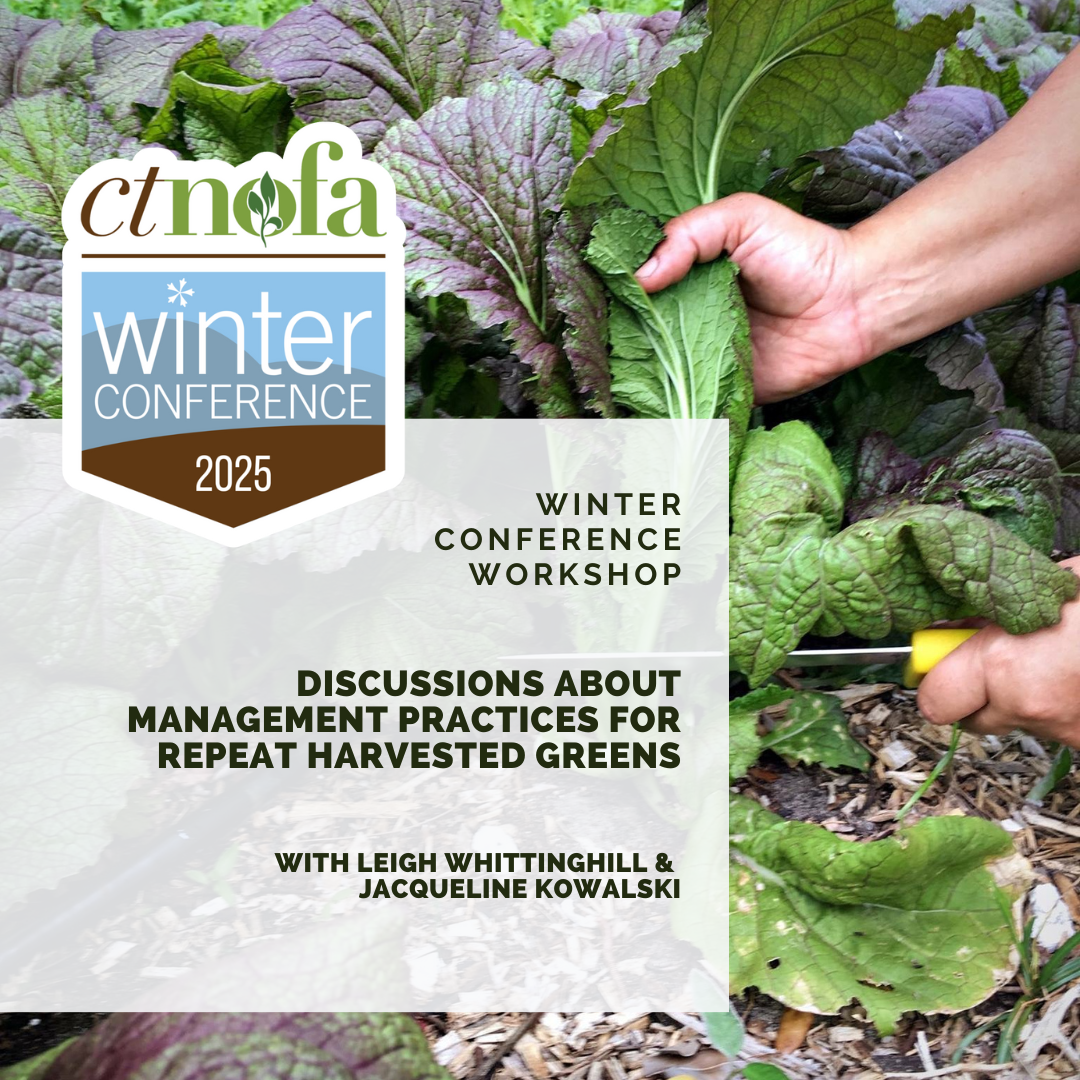
Discussions About Management Practices For Repeat Harvested Greens
11:15 AM
LEIGH WHITTINGHILL and JACQUELINE KOWALSKI | The Connecticut Agricultural Experiment Station and UConn Extension
Tracks: Beginning Farmer
In this workshop, the practice of repeat harvesting, or cut-and-come-again production of greens, will be discussed. This will start with an introduction to the practice of cut-and-come again harvesting and the greens that are suited to this production style. While this is a common practice among small scale and urban producers, research-based production recommendations that maximize yield and crop quality at later harvests do not exist. Research is currently being conducted at the Connecticut Agricultural Experiment Station to develop these research-based guidelines that will help growers new to the practice of cut-and-come-again, as well as experienced growers, looking to improve production. Current research projects and their preliminary findings will be shared with the workshop group. A questionnaire about production practices currently being used by farmers will be used to facilitate dialogue about present practices and research findings. The workshop will be concluded with a discussion about what additional challenges farmers using this practice may face that could help in the creation of research projects and extension programming that would address those challenges.
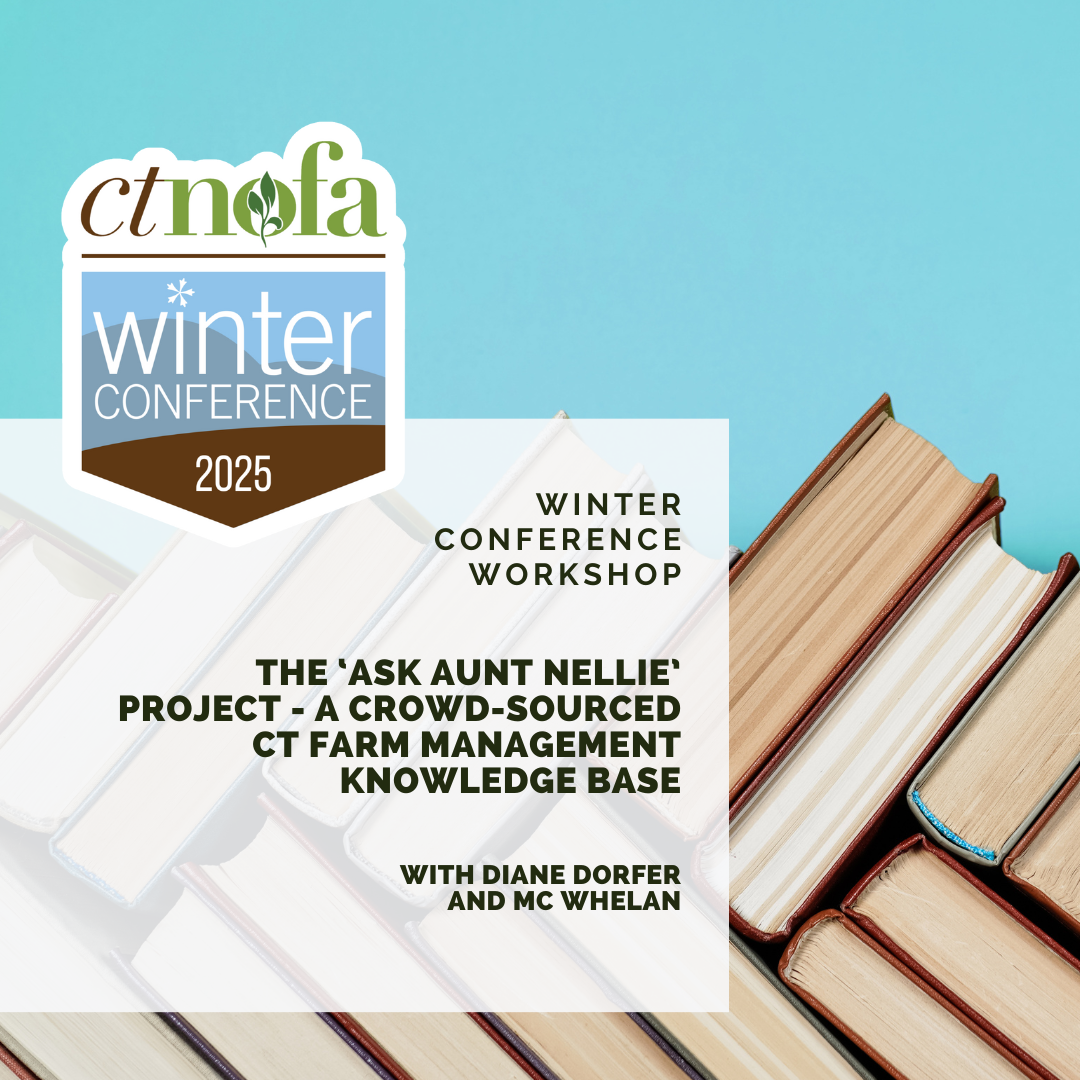
The Ask Aunt Nellie Project – A Crowd-Sourced CT Farm Management Knowledge Base
11:15 AM
DIANE DORFER and MC WHELAN
Tracks: Beginning Farmer
Ask Aunt Nellie (AAN) is a farmer-led project to build a collaborative database of sourcing for all the stuff and services we need to run our farms. In the early years of my farm, a lot of time and effort went into finding trustworthy and economical suppliers for farm goods and services, from potato plows & wax boxes to tax consultants & payroll services, and I know this experience is not unique. I designed this project so that all of us as CT farmers can support each other with our knowledge. So many of us start from scratch and don’t have an older generation to call upon, and as I’ve learned recently, a number of the older generation are interested to learn more about how younger folks are operating their farms. With your help, Ask Aunt Nellie can be a vital resource that serves us all.
This workshop will be a collaborative exercise in building and testing the AAN database. We are currently in the process of collecting sourcing info for the database, and verifying that the organizational structure we are imagining suits fellow farmers. New and beginning farmers, this will be a great opportunity for you to inform our process, and help us build a useful product. Established farmers, we’d really appreciate you sharing your knowledge and perspective. Peer-to-peer learning at its best!
Ask Aunt Nellie will be a free resource for CT farmers. The project is funded by Cobblestone Farm’s NE SARE farmer grant, with additional support from UConn Engineering’s Small Farm Innovations project and the New CT Farmer Alliance. This workshop is for current and aspiring production farmers.
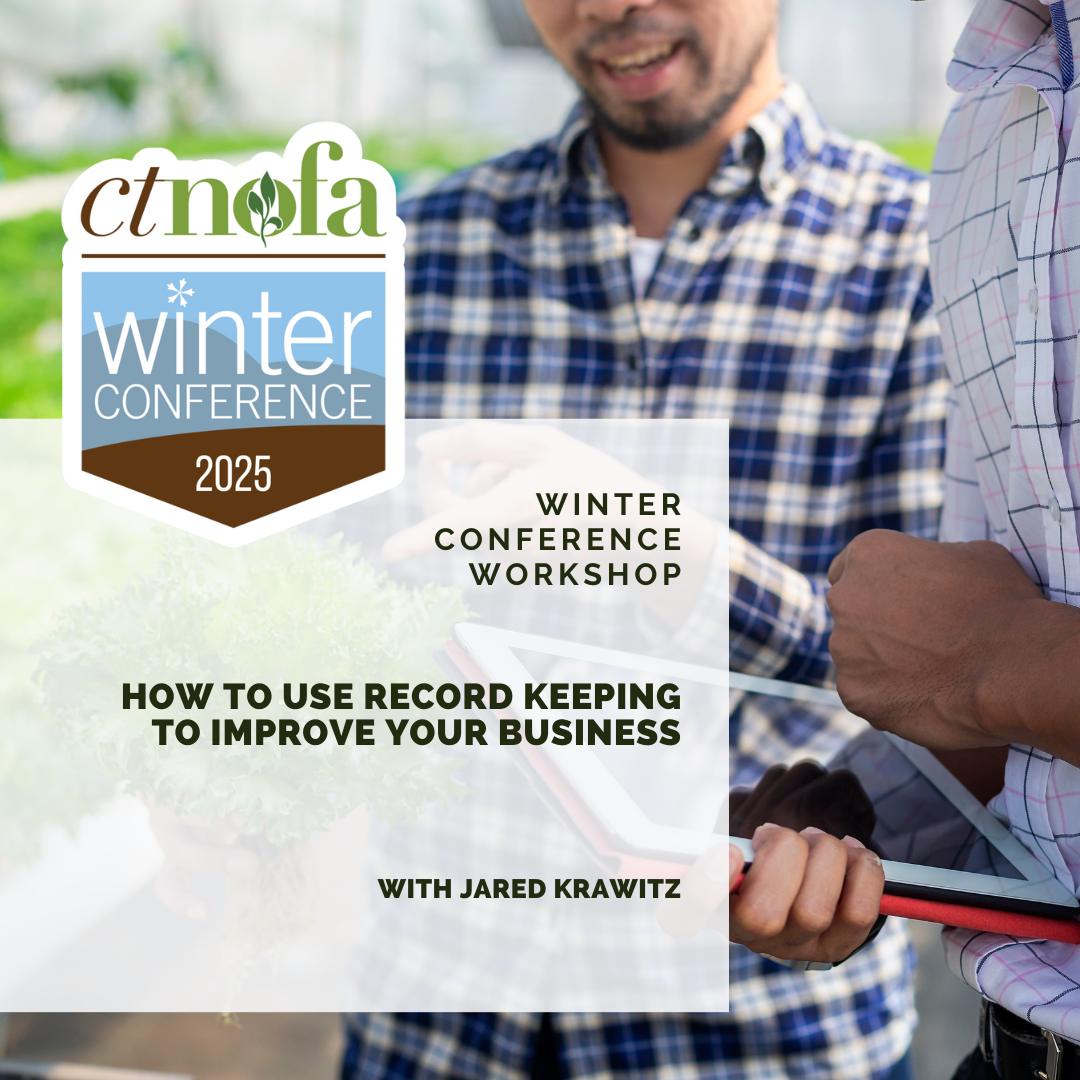
How to Use Record Keeping to Improve Your Business
11:15 AM
JARED KRAWITZ | Closter Farm & Livestock Co.
Tracks: Transition to Organic Farming
Applying for and maintaining organic certification requires a significant amount of record keeping. At times, it can feel like a waste of energy to track all sorts of things that you may know intuitively, or at least think you know intuitively. A well designed record keeping system can provide valuable insight into how your business is performing, what crops/livestock are actually making you a profit, and what systems are holding your team back from being more efficient.
This discussion will highlight record keeping systems that we use at Closter Farm to track our organic processes, improve our margins, and build a better farm. This workshop is designed for farmers, farm employees, and other agriculture professionals with 3+ years of experience and assumes a working knowledge of agri-business.
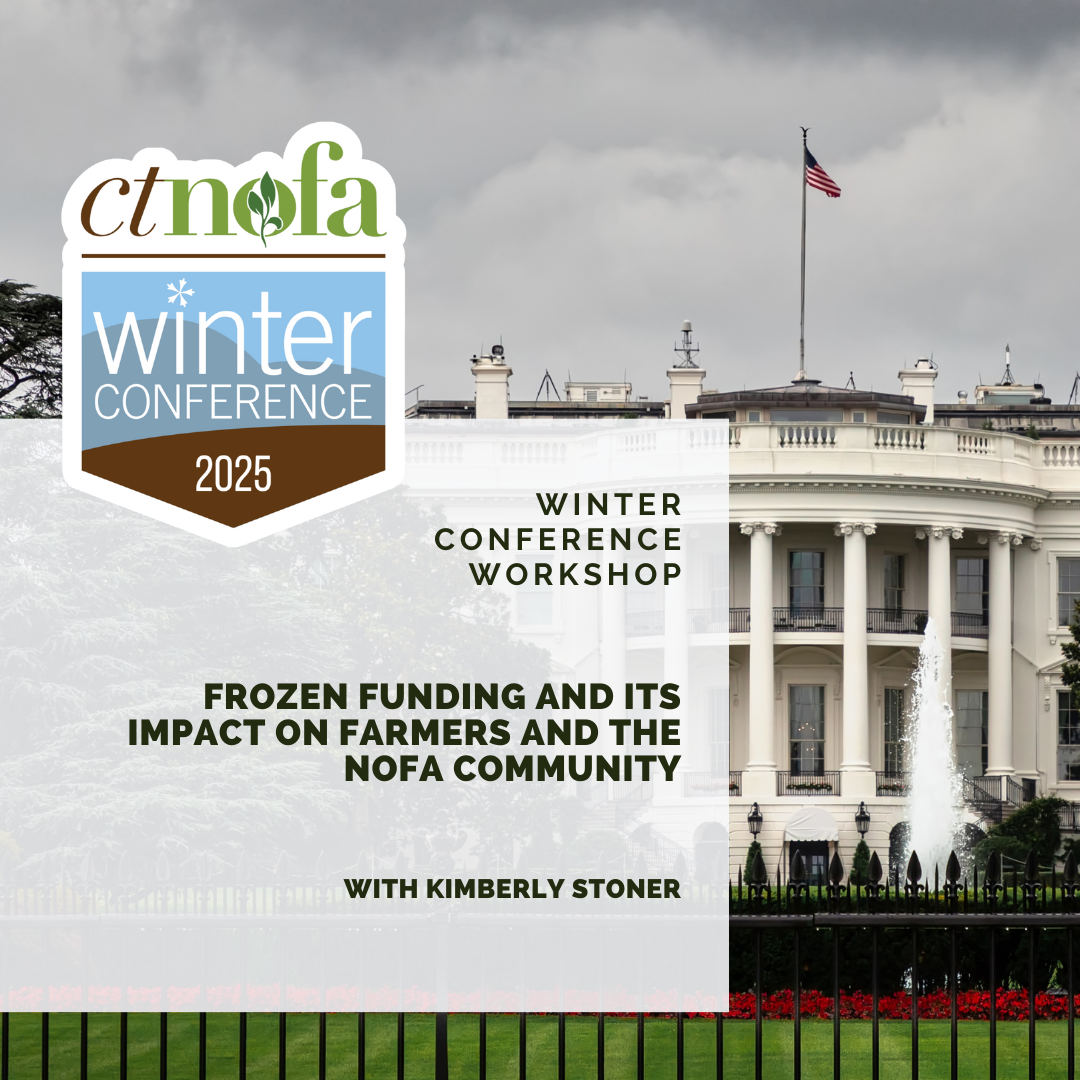
Frozen Funding and its Impact on Farmers and the NOFA Community
11:15 AM
DR. KIMBERLY STONER | CT NOFA Director of Advocacy
Tracks: Policy and Advocacy
Over the last six weeks, several federal grants for farmers have been frozen, existing contracts have been broken, and websites containing data that farmers rely on have been taken down.
CT NOFA and our sister NOFA chapters are determined to continue our mission, to serve our community in all of its diversity, and to continue our work to mitigate and adapt to climate change. We are documenting the impacts of the recent federal funding freeze and executive orders on farmers and food businesses in the Northeast.
In this workshop, we will share information about what is happening in our state to farmers, to the organizations and agencies that serve our farmers and food systems, and what actions we are taking to advocate for our organic farm, food, and land care community.
session 3 (4:15pm-5:30pm)
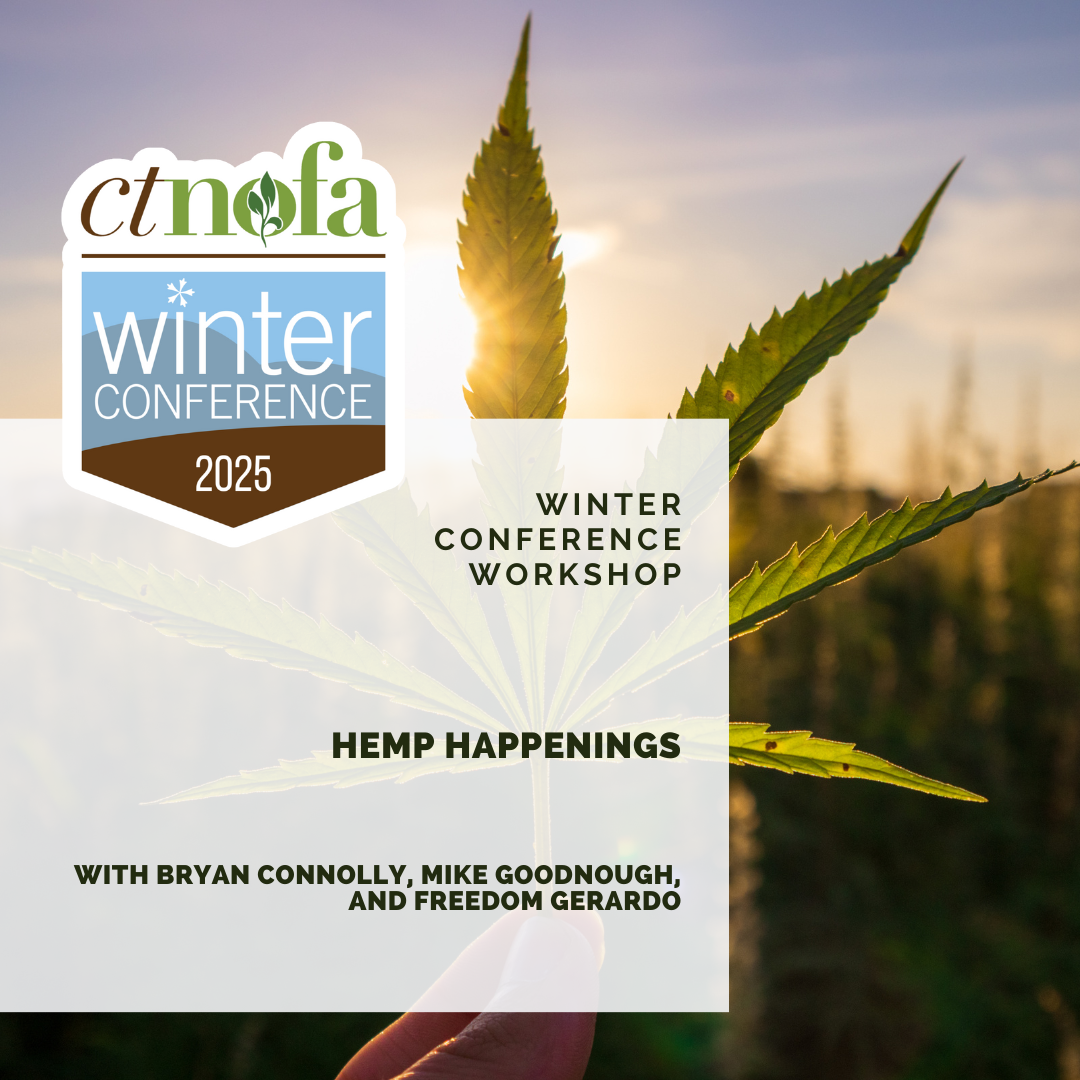
Hemp Happenings
4:15 PM
Dr. BRYAN CONNOLLY, MICHAEL GOODNOUGH, and FREEDOM GERARDO
Tracks: Policy and Advocacy
Join this workshop for a discussion with a panel of professionals in the hemp and Cannabis industry. The topics will range from new growing techniques and research discoveries to changes in Connecticut State Regulations. The purpose of the panel is to help keep the public informed about new advances in the field of hemp and Cannabis as well as changes in state regulations.
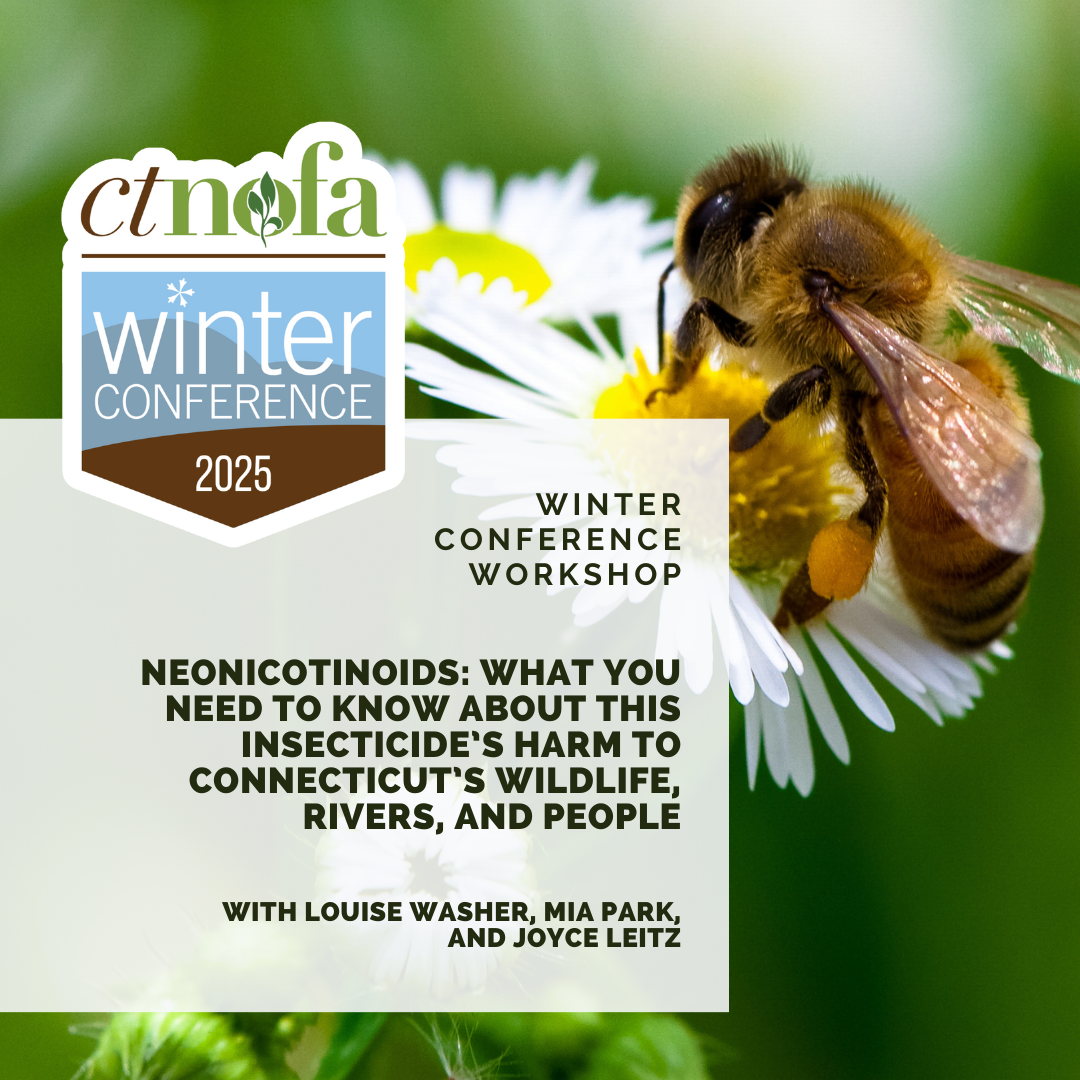
Neonicotinoids: What You Need to Know About this Insecticide’s Harm to Connecticut’s Wildlife, Rivers, and People
4:15 PM
LOUISE WASHER, MIA PARK, and JOYCE LEIZ
Tracks: Policy and Advocacy
Neonicotinoids, the most widely used insecticides in the world, are devastating bird, bee, and other insect populations and, as a result, hollowing out whole ecosystems. Studies show they jeopardize monarch butterflies and over 200 listed and endangered species. Connecticut beekeepers are affected by these pesticides. “Neonics” were the most common pesticides found in honey bee-collected pollen in Connecticut in a 2017 CT Agricultural Experiment Station study.
Connecticut beekeepers have routinely lost about half their colonies over the winter and up to 70% throughout the year. A new report from UCONN shows neonics are present in more than half of Connecticut rivers at levels shown to be damaging to river insects, the base of the aquatic food chain. US Geological Survey testing also detects neonics in Connecticut ground water, which poses a potential threat to human health. Neighboring states have joined Europe and parts of Canada in passing legislation to restrict or ban certain uses of neonics. Join us to learn more about these pesticides, alternatives to their use, and legislation proposed in Connecticut that would limit uses shown to yield little to no economic benefit to farmers and landscapers but that contribute significantly to environmental harms.

A Fresh Take on Food Recovery: Building Resilient Systems for a Sustainable Future
4:15 PM
LORI MARTIN | Haven's Harvest
Tracks: Food Justice
Food recovery has evolved far beyond simply reducing waste—it is now a cornerstone of creating resilient and equitable food systems. By addressing food waste at its source and redistributing surplus to those in need, food recovery combats food insecurity, reduces environmental impacts, and strengthens community resilience. This session, led by Lori Martin, Executive Director of Haven’s Harvest, explores the transformative power of food recovery as a tool for driving social, environmental, and economic change.
Lori will draw on the proven model of Haven’s Harvest to demonstrate how bridging the gap between surplus food and need can generate ripple effects across food systems. From mitigating greenhouse gas emissions to fostering trust and collaboration among diverse stakeholders, food recovery has far-reaching implications. Through real-world examples, participants will learn how small, localized efforts can have profound impacts when scaled or replicated.
The session will also address the latest innovations and ongoing challenges in food recovery, from emerging technologies that optimize logistics to strategies for navigating food safety regulations and mobilizing volunteers. Participants will gain actionable tools to overcome barriers and implement practical solutions within their own communities.
More than an environmental solution, food recovery is a vital part of building thriving, sustainable systems that work for people and the planet. Attendees will leave this session inspired and equipped to take meaningful steps toward creating lasting change.
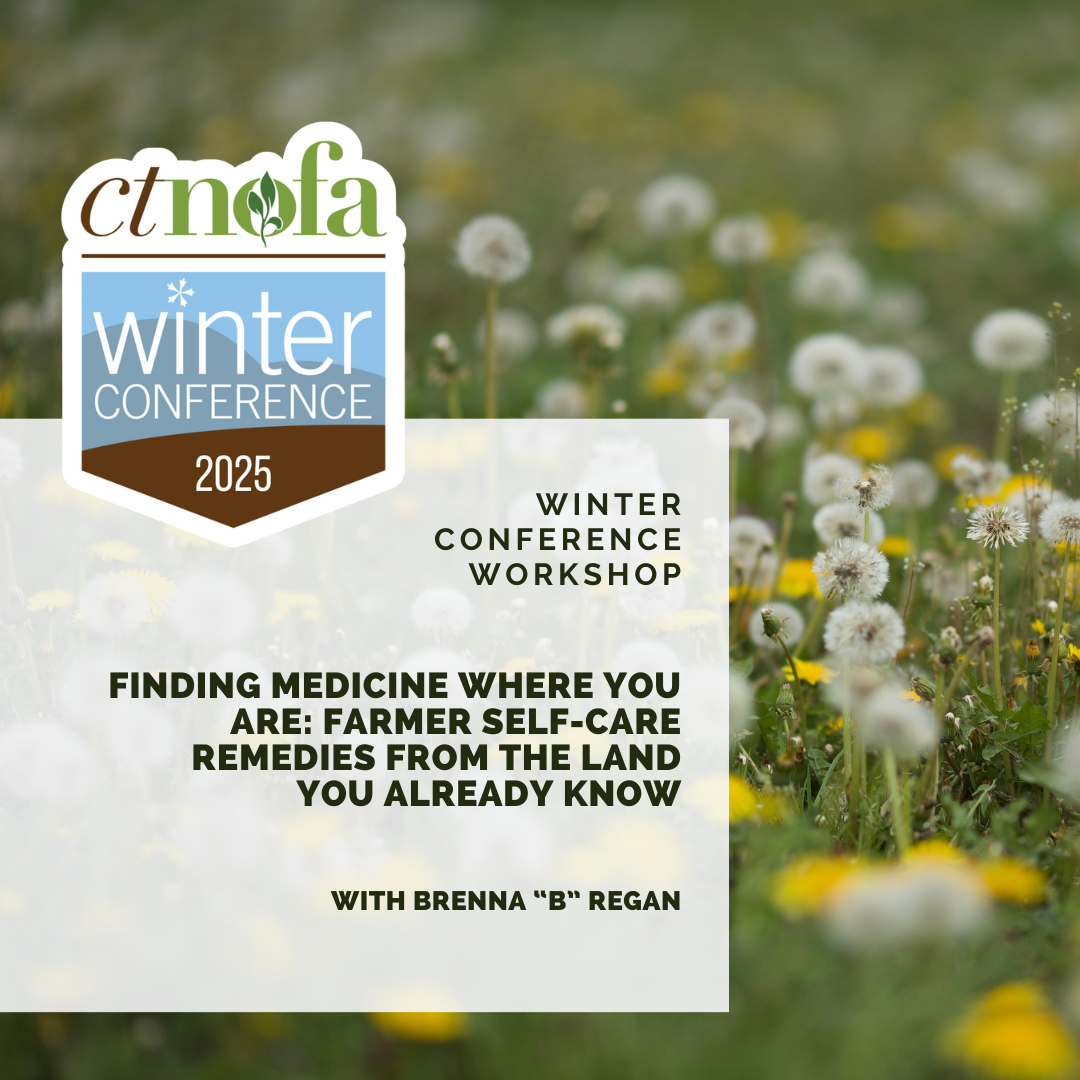
Finding Medicine Where You Are: Farmer Self-Care Remedies from the Land You Already Know
4:15 PM
BRENNA "B" REGAN | Other + Earth
Tracks: Homesteader/Gardener
This interactive workshop invites farmers to deepen our connection with the plants we often battle in our fields. Many of the plants we see as “weeds” – dandelion, plantain, nettle, violet, dock, goldenrod and more – have long lineages of being part of routine wellness care for people and land. This workshop is a step towards reclaiming these relationships within a context of LAND BACK to and solidarity with those who most intimately know this place. This workshop will share plant profiles of some of these plants and a few easy recipes for how to craft with them to make self-care and land-care remedies. Being of Irish and mixed European descent, and with the majority of my herbalism study having been based in Ireland, I will focus on plants that grow both in that region as well as CT/Quinnetukqut. We’ll end with some Q&A time and crafting an herbal tea bag to take home!
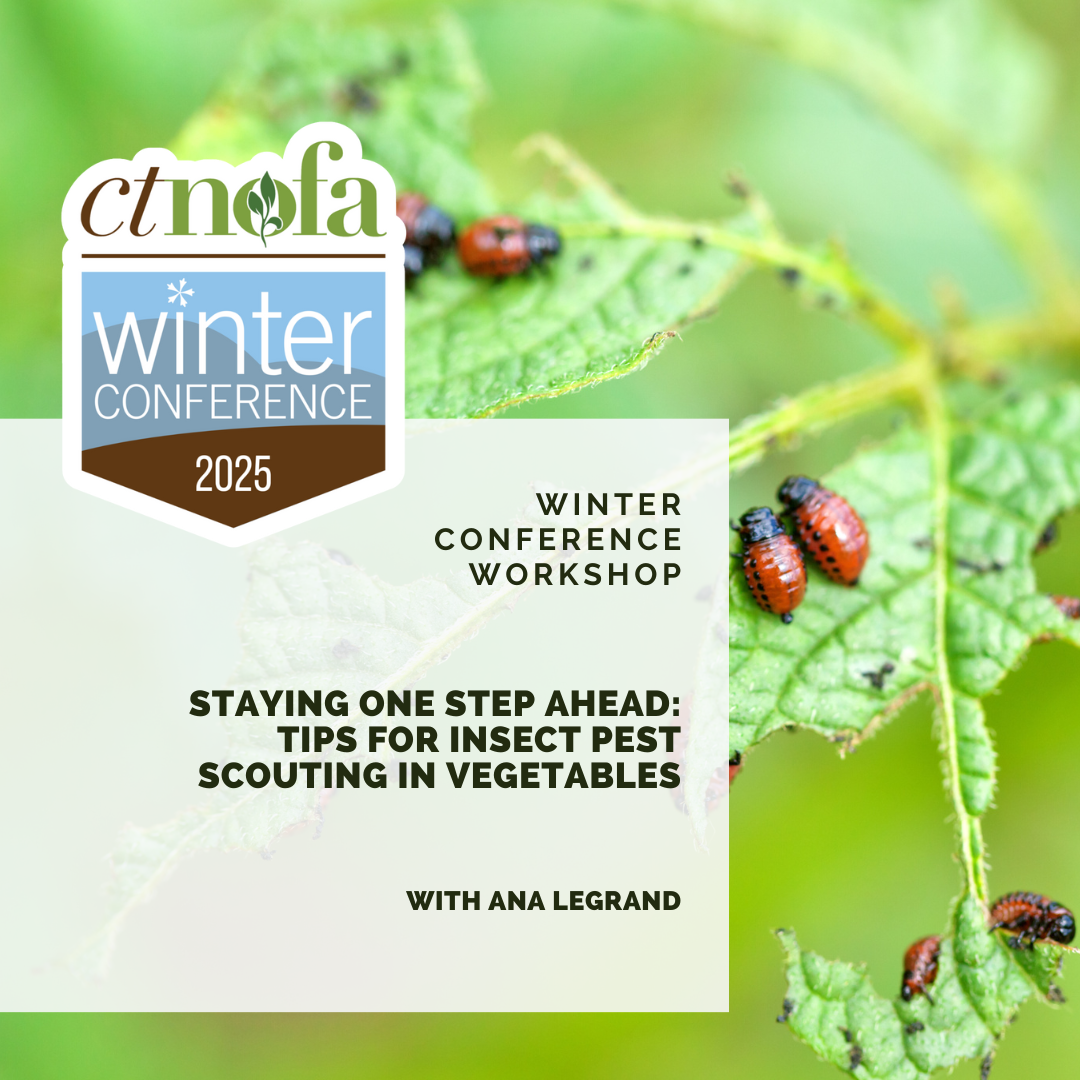
Staying One Step Ahead: Tips For Insect Pest Scouting In Vegetables
4:15 PM
DR. ANA LEGRAND | University of Connecticut
Tracks: Transition to Organic Farming
This workshop will cover techniques and tools that will help you stay many steps ahead of potential insect infestations. The focus will be on vegetable systems and how to detect different insect groups by utilizing insect evidence, plant damage symptoms, and tools like pheromone and visual traps.

Don’t Lose Your Shirt! Staying or Becoming Profitable in Time of Climate Crisis
4:15 PM
CIAN DALZELL | The Carrot Project
Tracks: Beginning Farmer
In this session you will learn management strategies to sustain your business operations and cashflow through challenging cycles of variable seasons. Rather than being reactive to disasters, we will employ a data-based understanding of our local weather variability as well as proactive planning to insulate our livelihoods from the pressures of climate change, reducing farmer stress that arises from things that feel “beyond our control.”
We will mix climate, farm financial, and operational data to further your farm’s stability, and improve your operation’s position against risk. This session will address the following farmer concerns:
- Managing through cycles of growing seasons with good and bad weather
- How to keep farming with personal sustainability and not lose your shirt
- Revenue shifts that will affect your business in the coming seasons
- Confidently using your farm financials to inform your decision-making
The Carrot Project works side-by-side with farm and food businesses to achieve their business goals and thrive long-term. Their personalized services have a long track record of increasing farm profitability.


